Caucasus Institute organizes various events, round tables, conferences, trainings and seminars. These events are aimed at strengthening the bond between science and society, fostering pluralism and stimulating the transfer of research results.
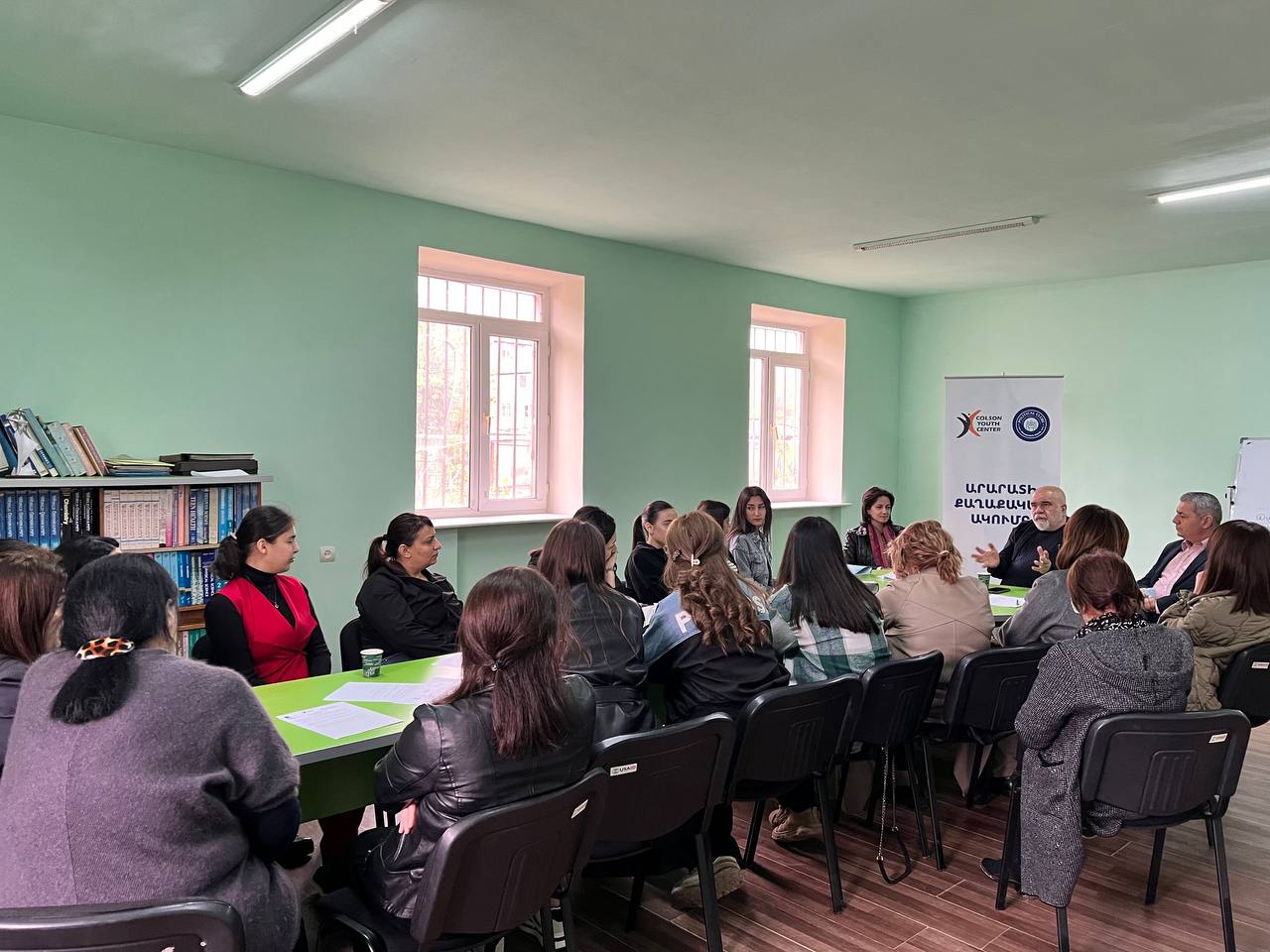
Political Clubs Discussions
PEACE TREATY VS REAL PEACE
On April 16, in Armenia’s Ararat region, the first discussion was held under the auspices of the Colson Youth Center NGO.The event focused on Armenia-Azerbaijan relations and the challenges surrounding a potential peace treaty. Political scientist Alexander Iskandaryan, Director of the Caucasus Institute and security expert Sergey Minasyan, Deputy Director of the Caucasus Institute shared their insights on the security challenges currently facing Armenia, as well as the impact of broader geopolitical developments on the regional landscape. The discussion was held under the framework of the Launching Political Clubs in Bordering Regions of Armenia project.

Political Clubs Discussions
ARMENIA’S EDUCATIONAL POLICY: ACHIEVEMENTS AND SHORTCOMINGS
In April 2025 “Launching Political Clubs in Bordering Regions of Armenia” project kicked off its third phrase in Yerevan. Under the auspices of Caucasus Institute, teachers, students and educational workers discussed Armenia’s educational policy, its achievements and shortcomings. Education expert Serob Khachatryan and co-founder of Aregnazan school, teacher Ara Atayan shared their insights about current chalalnges faced by the educational system as well as consequences of the ongoing reforms and their potential short and long-term impact. The experts also reflected on international best practices and their localization efforts in Armenia.
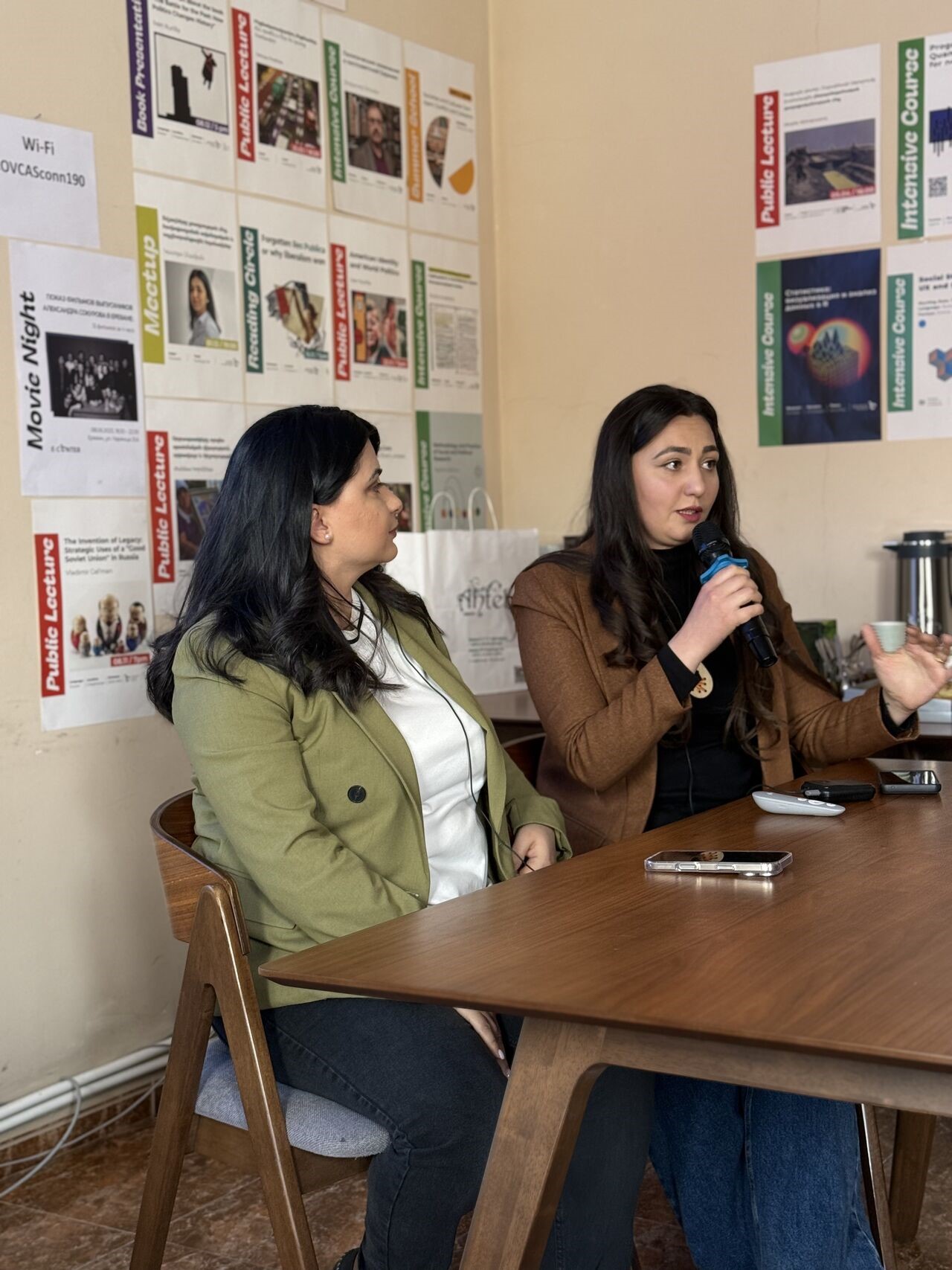
Pitching
ENGAGING SOCIETY AND GOVERNMENT IN ARMENIA IN DEVELOPING AN AGENDA FOR A SECURE REGION
On March 21st, the Caucasus Institute hosted a pitching event titled “Empowering Civil Society Actors from Nagorno-Karabakh.” Five civil society actors from Nagorno-Karabakh presented their projects to an audience of international organizations and representations. The primary focus of these projects is to support the integration of the people of Nagorno-Karabakh into Armenian society. We would like to extend our sincere thanks to all attendees for their participation and engagement. The event was organized as part of a project titled Engaging Society and Government in Armenia in Developing an Agenda for a Secure Region implemented by Caucasus institute and funded by the UK International Development from the UK government.

Conference
ENGAGING SOCIETY AND GOVERNMENT IN ARMENIA IN DEVELOPING AN AGENDA FOR A SECURE REGION
On 21 March 2025, the Caucasus Institute held an international conference entitled “Gathering Storm: Regional Security of the South Caucasus in the Context of the Crisis of the Global Order.” The conference brought together leading experts and scholars from Armenia, Georgia, Turkey, Norway and Romania. An Azerbaijani speaker participated remotely. The conference opened with remarks by H.E. Mr. John Gallagher, British Ambassador to Armenia. Extensively covered by both domestic and international media, the discussions provided in-depth analyses of the evolving security and political landscape in the South Caucasus framed within the broader context of the global geopolitical challenges. The conference was organized as part of a project titled Engaging Society and Government in Armenia in Developing an Agenda for a Secure Region funded by the UK International Development from the UK government. The project is implemented by the Caucasus Institute inpartnership with the Civil Society Institute and the Civilitas Foundation.

Simulation Game
ENGAGING SOCIETY AND GOVERNMENT IN ARMENIA IN DEVELOPING AN AGENDA FOR A SECURE REGION
From February 28 to March 2, the Caucasus Institute hosted a strategic simulation game and risk assessment tools seminar in Tsakhkadzor for the Republic of Armenia’s Security Council Office and Ministry of Defense staff. The strategic simulation game aimed to foster interagency government cooperation, while the development of risk assessment tools was designed to assist relevant agencies in evaluating security risks and threats effectively. The event was organized under the auspices of Engaging Society and Government in Armenia in Developing an Agenda for a Secure Region project implemented by the Caucasus Institute with UK International Development funding from the UK government.
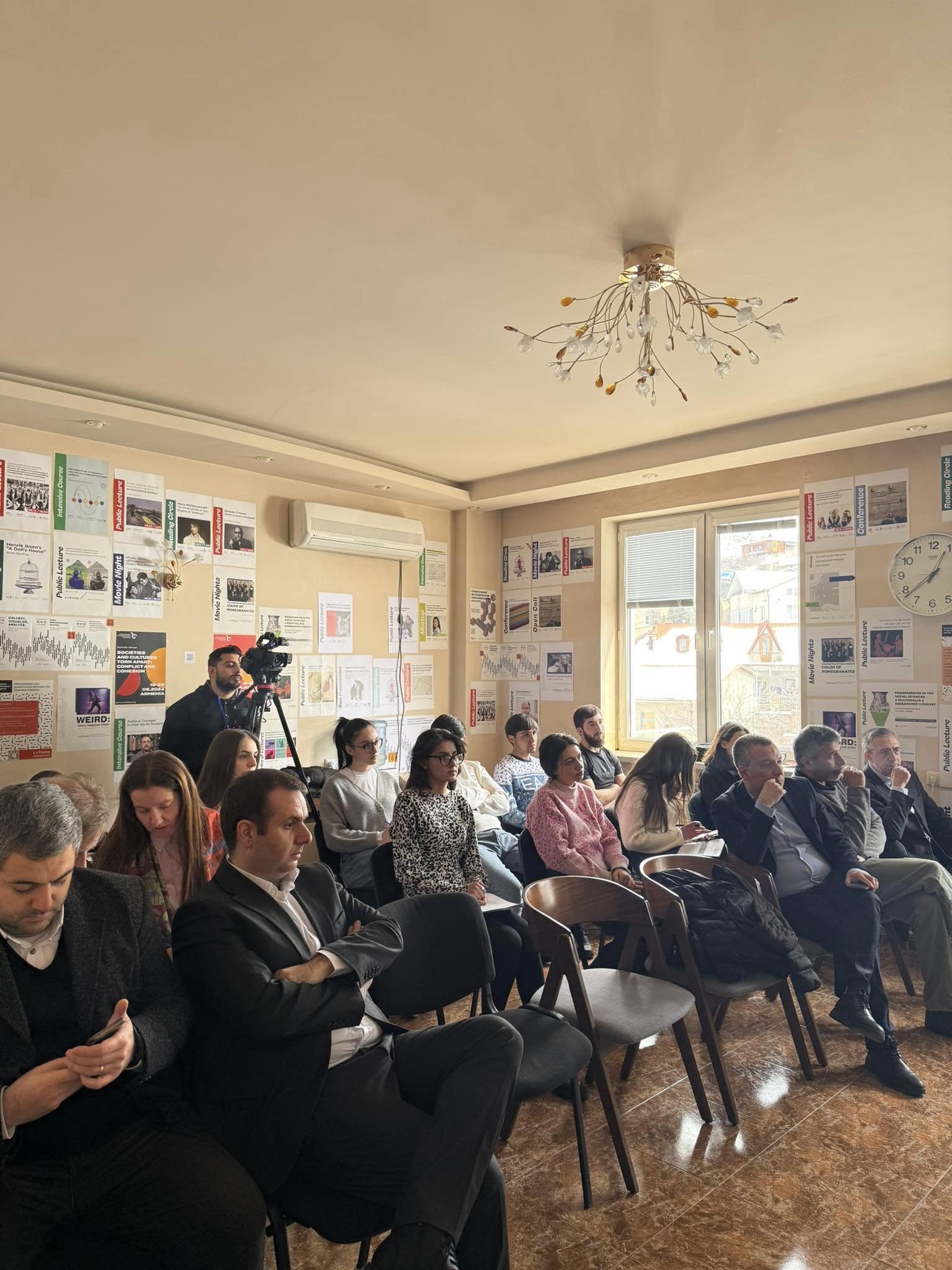
Press Conference
Harnessing Youth Engagement to Shape Armenia’s Democratic Future through an Analysis of Lessons Learned from Post-Revolutionary and Post-War Armenia
On February 25, the Caucasus Institute held a press conference titled “The Aftermath of the Revolution: Youth Support Domestic Policy, Reject Foreign Policy.” This event summarized the results of “Harnessing Youth Engagement to Shape Armenia’s Democratic Future through an Analysis of Lessons Learned from Post-Revolutionary and Post-War Armenia,” project, implemented by the Caucasus Institute and supported by CFLI. During the conference, Alexander Iskandaryan, Director of the Caucasus Institute, and Liana Khachatryan, Editor and Host of Lratvakan Radio, presented the outcomes of discussions held with youth from Armenia’s regions. Over several months, CI and other experts met with youth from the Syunik and Armavir regions, asking them to share their views on past and future changes in post-war and post-revolutionary Armenia and explored the differences and similarities between the two regions.

Roundtable discussion
ENGAGING SOCIETY AND GOVERNMENT IN ARMENIA IN DEVELOPING AN AGENDA FOR A SECURE REGION
On December 10, the Caucasus Institute hosted a roundtable discussion on regional and national security issues. At the roundtable, representatives of government bodies in charge of foreign affairs, security and defence met with experts from Armenian and British research institutions. Keynote speeches were delivered by Laurence Broers, Associate Fellow of the Russia & Eurasia Programme at Chatham House, and colonel Artsrun Hovhannisyan, Head of the Command and Staff Institute at the Vazgen Sargsyan Military University affiliated with Armenia’s Ministry of Defence. The roundtable discussion was organized in the framework of the project Engaging Society and Government in Armenia in Developing an Agenda for a Secure Region (Phase 3) implemented by the Caucasus Institute in partnership with Civil Society Institute and Civilitas Foundation. The project is funded with UK International Development from the UK government.
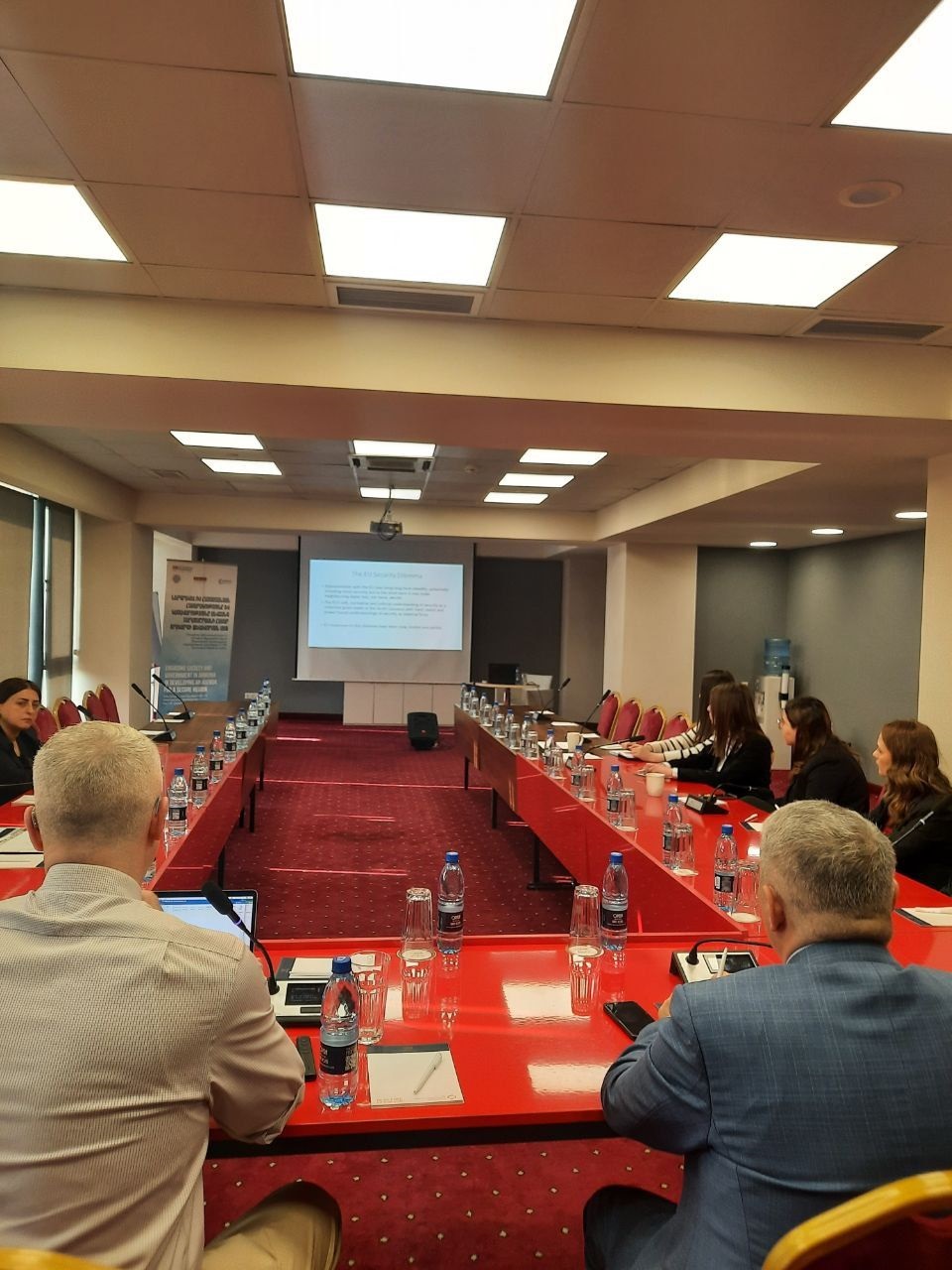
Training
ENGAGING SOCIETY AND GOVERNMENT IN ARMENIA IN DEVELOPING AN AGENDA FOR A SECURE REGION
From December 9-11, 2024, the Caucasus Institute completed the second round of a training course for the staff of Armenia’s state institutions in foreign policy, defence, and security. Delivered in a hybrid format that combined online and in-person sessions, the course provided participants with the opportunity to engage with British and Armenian experts. Discussions covered international best practices in the security sector, including the functioning of National Security Councils and their interoperability with peer security and defense agencies. The training also focused on critical issues related to regional peace and stability. The training course was delivered in the framework of the project Engaging Society and Government in Armenia in Developing an Agenda for a Secure Region (Phase 3) implemented by the Caucasus Institute in partnership with Civil Society Institute, and Civilitas Foundation. The project is funded with UK International Development from the UK government.
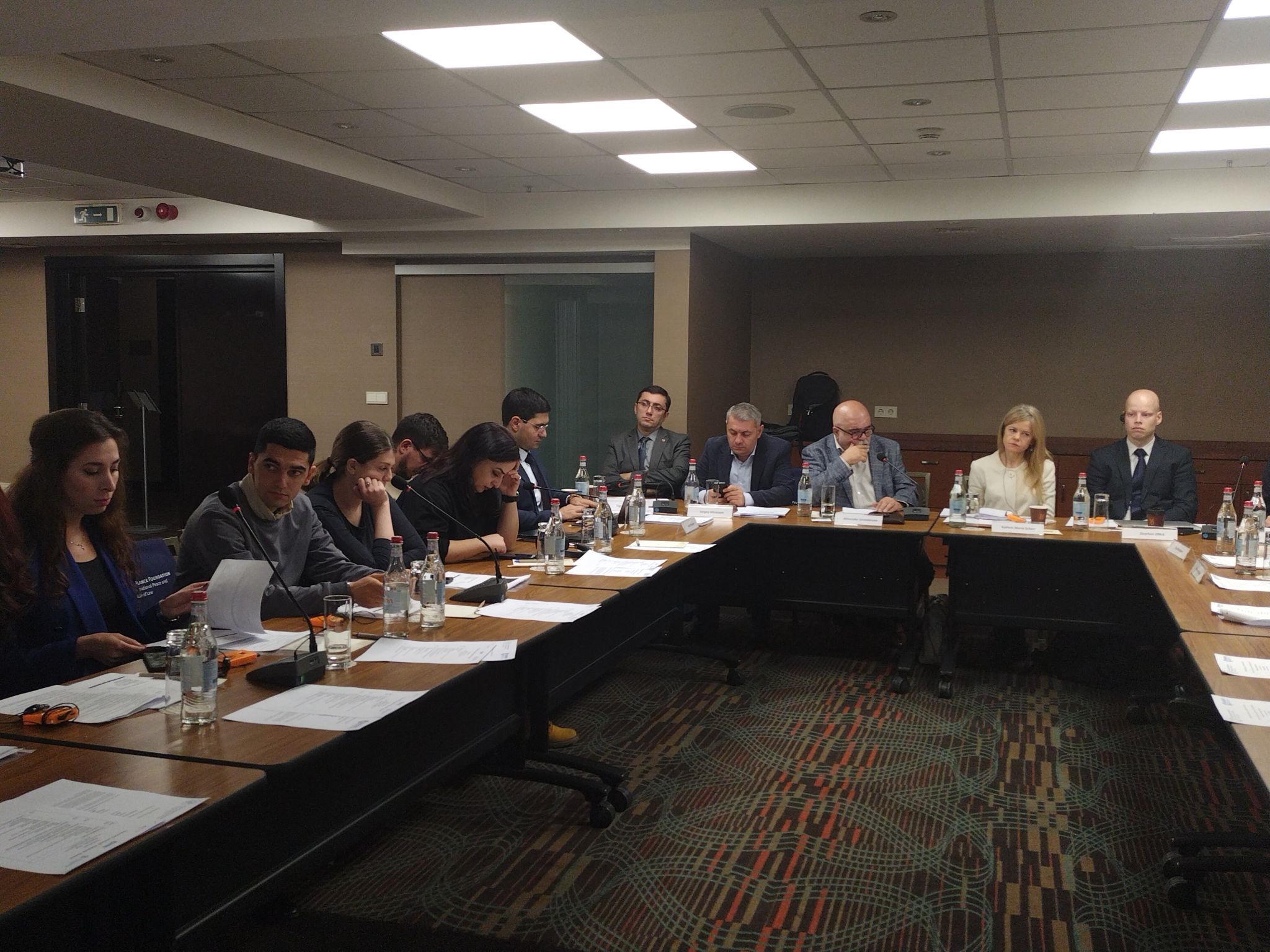
Conference
ELABORATING VISION ON ARMENIA’S FUTURE:
THE COUNTRY OF MY DREAMS, HOW TO GET THERE
On December 5, 2024 the Caucasus Institute, in collaboration with the Max Planck Foundation for International Peace and the Rule of Law, successfully held the final event of the Promoting Future-Oriented Youth Dialogues project. This initiative was made possible through the support of the German Federal Foreign Office.The final conference brought together active youngsters from Syunik, Shirak, Yerevan and Nagorno-Karabakh. They presented their visions for Armenia’s future in such spheres as security, foreign policy, migration, economic development, and education.
During their presentations, the participants referred to the main impediments in the spheres, and possible ways to deal with them. Attended by representatives from the Ministry of Defense, Ministry of Internal Affairs, Ministry of Finance, as well as academia and the expert community, the conference enabled a debate between the youth, policy-makers and experts over the most urgent issues in domestic and foreign policies of Armenia. Most importantly, the conference served as a platform for the youngsters to get across policy-makers and experts their visions for Armenia’s future. Our regional partners, the Goris Press Club from Syunik and the All Rights Foundation from Shirak, were actively involved in both the planning and execution of the event and were present among the attendees at the conference.
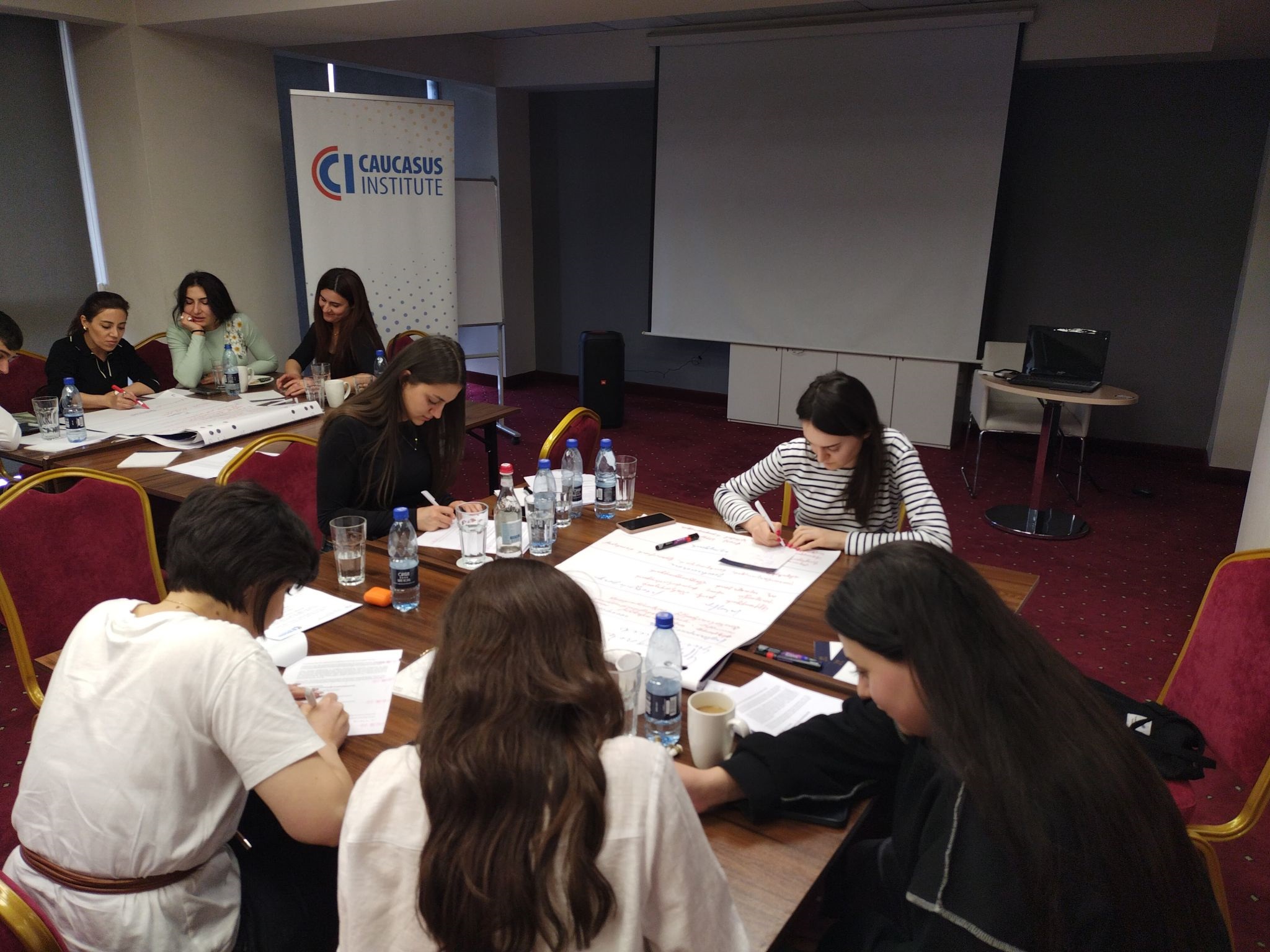
Workshop
ELABORATING VISION ON ARMENIA’S FUTURE:
THE COUNTRY OF MY DREAMS, HOW TO GET THERE
On November 26, 2024 the Caucasus Institute, in collaboration with the Max Planck Foundation for International Peace and the Rule of Law, successfully concluded the final workshop of the Promoting Future-Oriented Youth Dialogues project. This initiative was made possible through the support of the German Federal Foreign Office.
The workshop brought together a dynamic and engaged group of youth and students from Nagorno-Karabakh to explore visions for Armenia’s future.
Focusing on critical themes such as security, foreign policy, migration, economic development, and education, participants engaged in collaborative group work to identify the challenges impeding progress in these areas. They also pinpointed key stakeholders who could play crucial roles in driving transformative change.During the workshop’s final session, each group presented their visions and actionable recommendations to address the identified challenges.Participants had the unique opportunity to share their ideas with experts, receiving valuable feedback to refine their approaches further.

Study Visit
ENGAGING SOCIETY AND GOVERNMENT IN ARMENIA IN DEVELOPING AN AGENDA FOR A SECURE REGION
On November 17-21, 2024 the Caucasus Institute conducted a study visit to London for representatives of Armenia’s Security Council, Ministry of Foreign Affairs, and Ministry of Defence. The purpose of the visit was to explore the UK’s experience in policy elaboration and interagency cooperation in the fields of security, defence and foreign policy. During the visit, participants met with UK counterparts from the Secretariat of the National Security Council, the Foreign, Commonwealth & Development Office (FCDO), the Ministry of Defence (MoD), and the Foreign Affairs Committee of the UK Parliament. The delegation also engaged with representatives of leading British think tanks and academic institutions specializing in security, defence and foreign policy studies, including RUSI, IISS, Chatham House and the LSE. At the Embassy of Armenia in the UK, the group had a meeting with Ambassador Varuzhan Nersesyan and embassy staff. The visit was organized within the framework of the project Engaging Society and Government in Armenia in Developing an Agenda for a Secure Region, implemented by the Caucasus Institute with the support of UK International Development funding from the UK government.
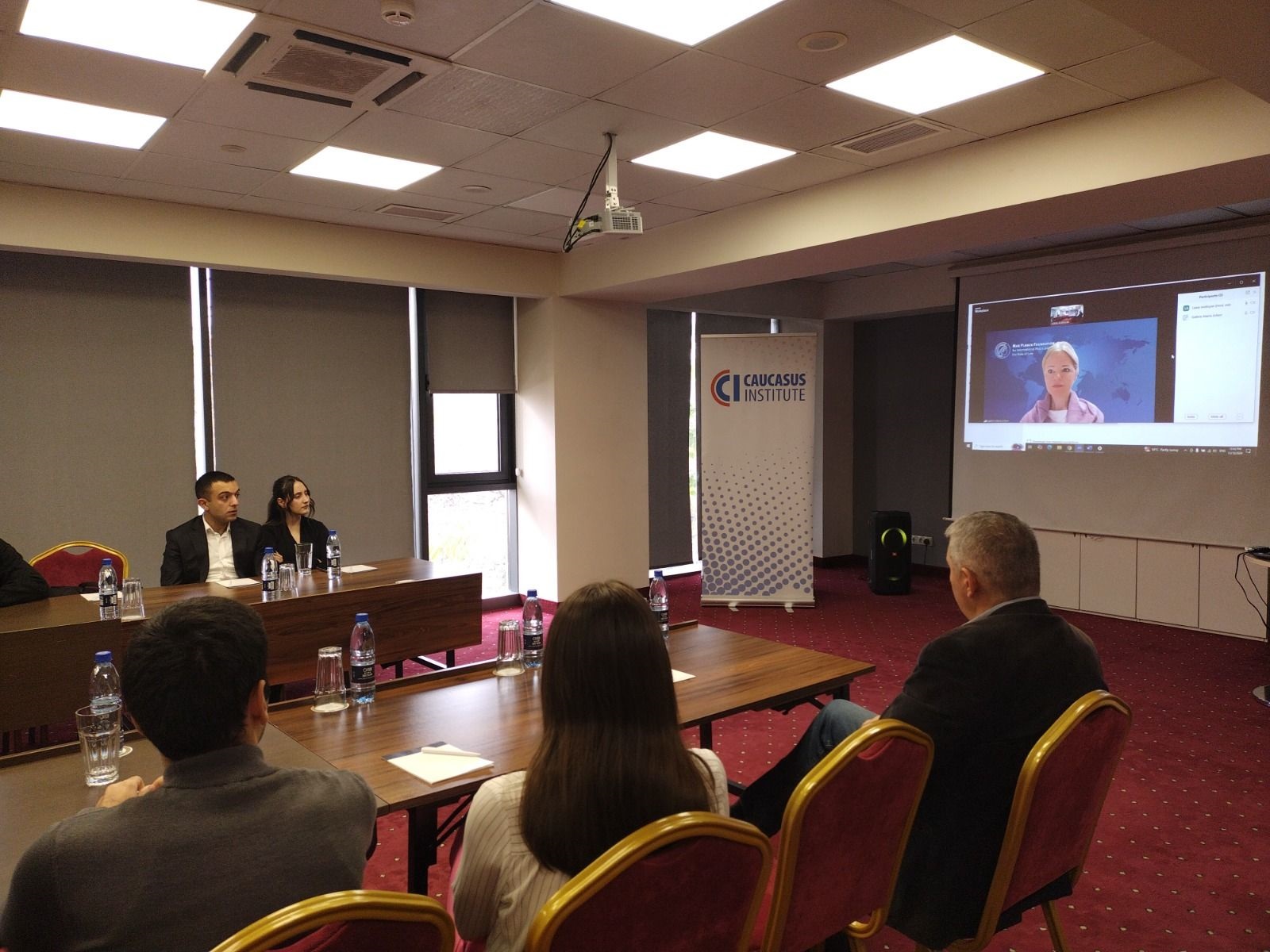
Workshop
ELABORATING VISION ON ARMENIA’S FUTURE:
THE COUNTRY OF MY DREAMS, HOW TO GET THERE
On November 12, 2024 the Caucasus Institute, in partnership with the Max Planck Foundation for International Peace and the Rule of Law, successfully held the third workshop under the project Promoting Future-Oriented Youth Dialogues. This initiative is generously funded by the German Federal Foreign Office.
The workshop took place in Yerevan, engaging a dynamic group of youth and students who contributed to critical discussions about Armenia’s future.
The workshop focused on exploring visions for Armenia’s future, with participants addressing key areas such as security, foreign policy, migration, economic development, and education. Through collaborative group work, participants mapped out obstacles hindering progress in these areas and identified potential stakeholders who could play a role in shaping the country’s future.
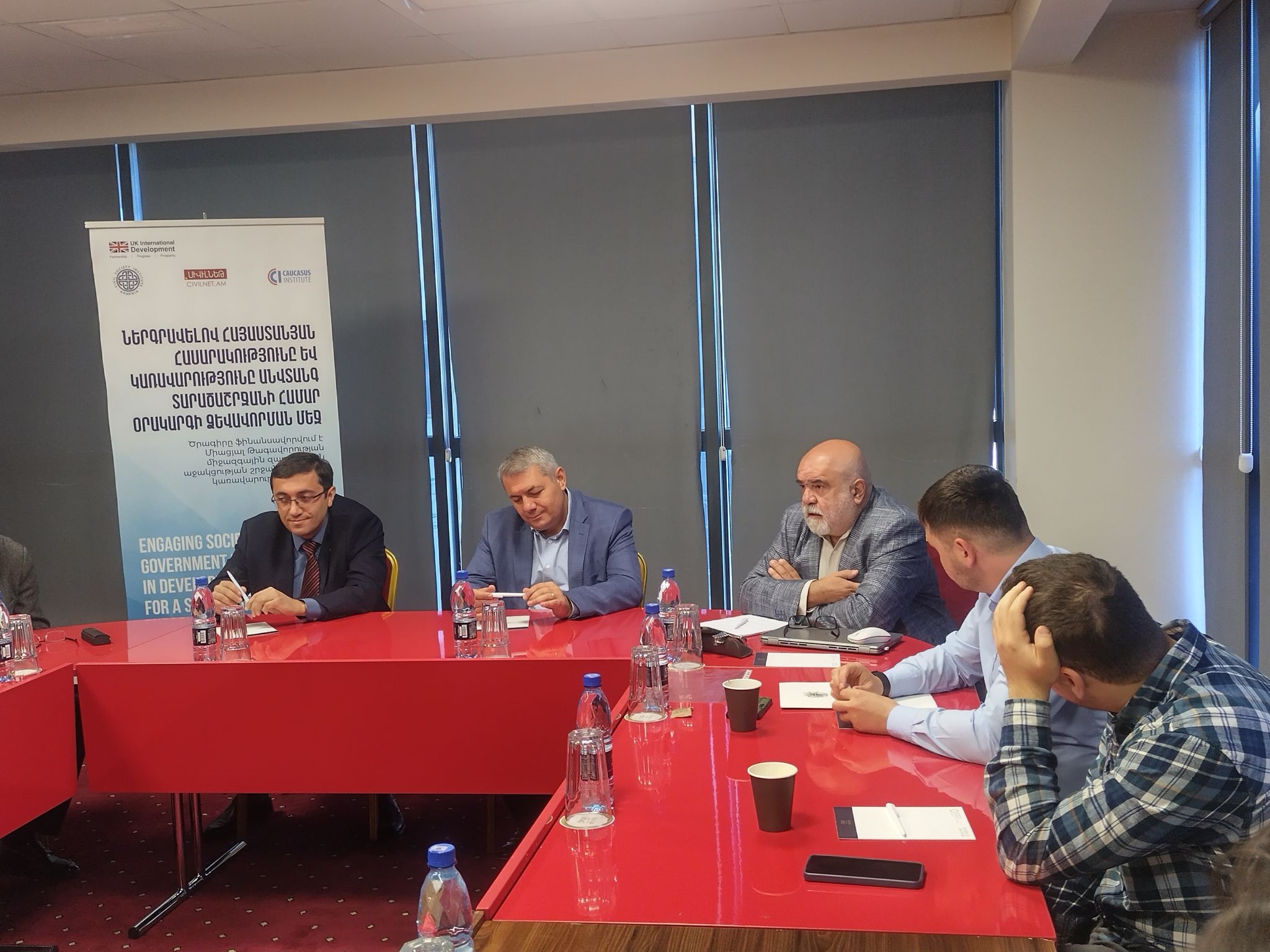
Training
ENGAGING SOCIETY AND GOVERNMENT IN ARMENIA IN DEVELOPING AN AGENDA FOR A SECURE REGION
From October 21- 24, 2024, the Caucasus Institute concluded the first round of a training course for the staff of Armenia’s state institutions in foreign policy, defence, and security. In the course, participants explored the constitutional and legal foundations of the security sector, delved into policy-making and decision-making processes, and built critical analysis capacity essential for their fields. The training also covered practical skills in the realms of research, academic writing, cybersecurity, strategic communication, and leadership communication in line with their roles. The training course was organized by the Caucasus Institute within the project on Engaging Society and Government in Armenia in Developing an Agenda for a Secure Region, implemented with the support of UK International Development funding from the UK government.
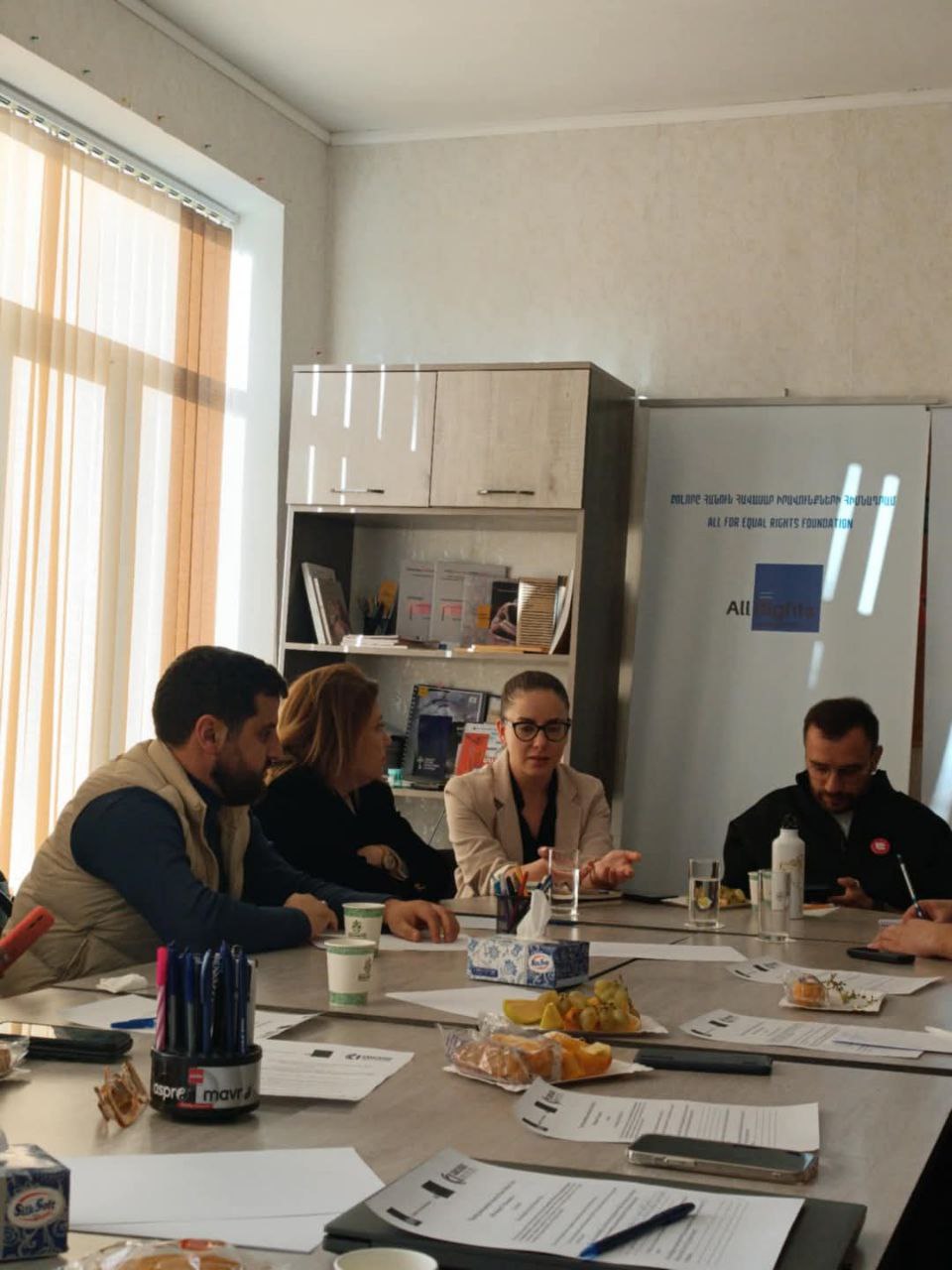
Political Clubs Discussions
DIALOGUE AND ADVOCACY BETWEEN PRIVATE AND PUBLIC SECTOR
As part of the Launching Political Clubs in Bordering Regions of Armenia project, the third discussion of the Political Club of Shirak was held on October 22, 2024 at the All Rights Foundation in Gyumri. The discussion was led by Gevorg Poghosyan, Executive Director of Impact Hub Luiza Ayvazyan, Head of Office, Armenia Branch of CIPE. The discussion centered on the importance of strengthening cooperation, dialogue, and advocacy between the public and private sectors. Participants explored necessary changes in public policies and legal regulations to create a more supportive environment for private sector development. The speakers also proposed more effective methods of dialogue to align the interests of both sectors and promote economic growth.Participants deliberated on ways to activate this dialogue, raising questions about the direction of state policies and the needs of the private sector. The project is supported by the government of the Kingdom of the Netherlands.
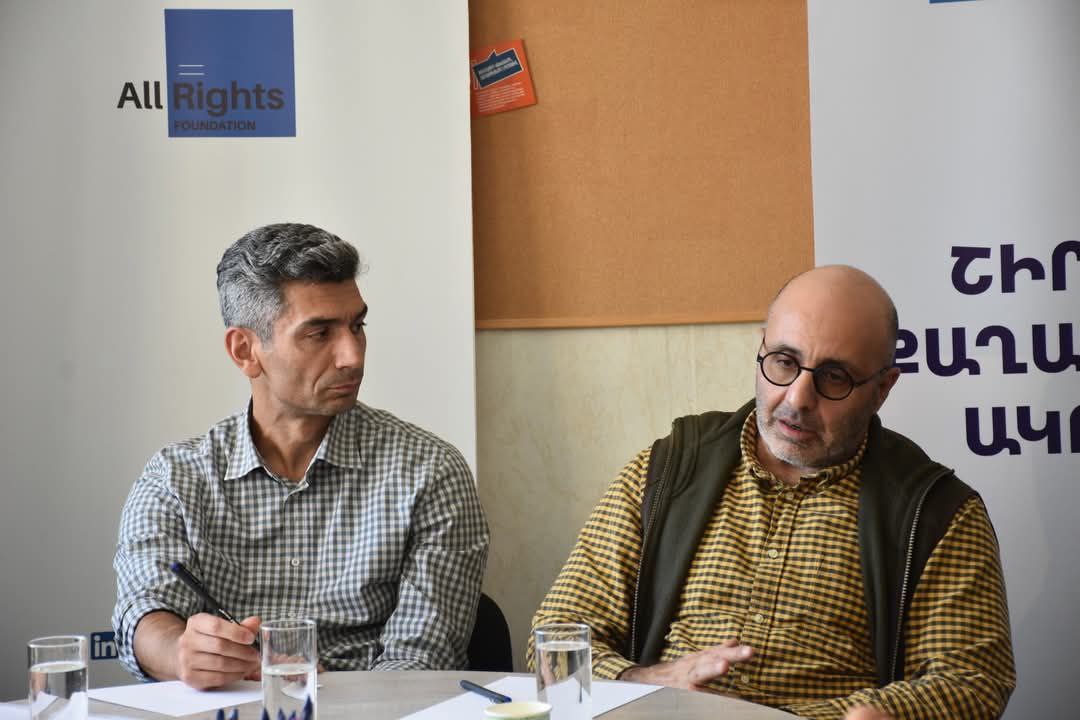
Political Clubs Discussions
THE POSSIBLE OPENING OF ARMENIA-TURKEY BORDER
Under the framework of the Launching Political Clubs in Bordering Regions of Armenia project, the second discussion was held on October 5, 2024 at the All Rights Foundation in Gyumri. The discussion. led by Artak Shakaryan, turkiologist and Tigran Jrbashyan, Partner, Director of Management Advisory at Ameria Advisory, focused on the potential consequences, risks, and opportunities of opening the Armenia-Turkey border, with an emphasis on political, economic, and social implications. The experts stressed the importance of implementing strict controls to mitigate potential risks and threats associated with the border opening. Participants raised questions about control mechanisms and economic policies. The discussion was highly informative, addressing gaps in unbiased information among the participants. The project is supported by the government of the Kingdom of the Netherlands.
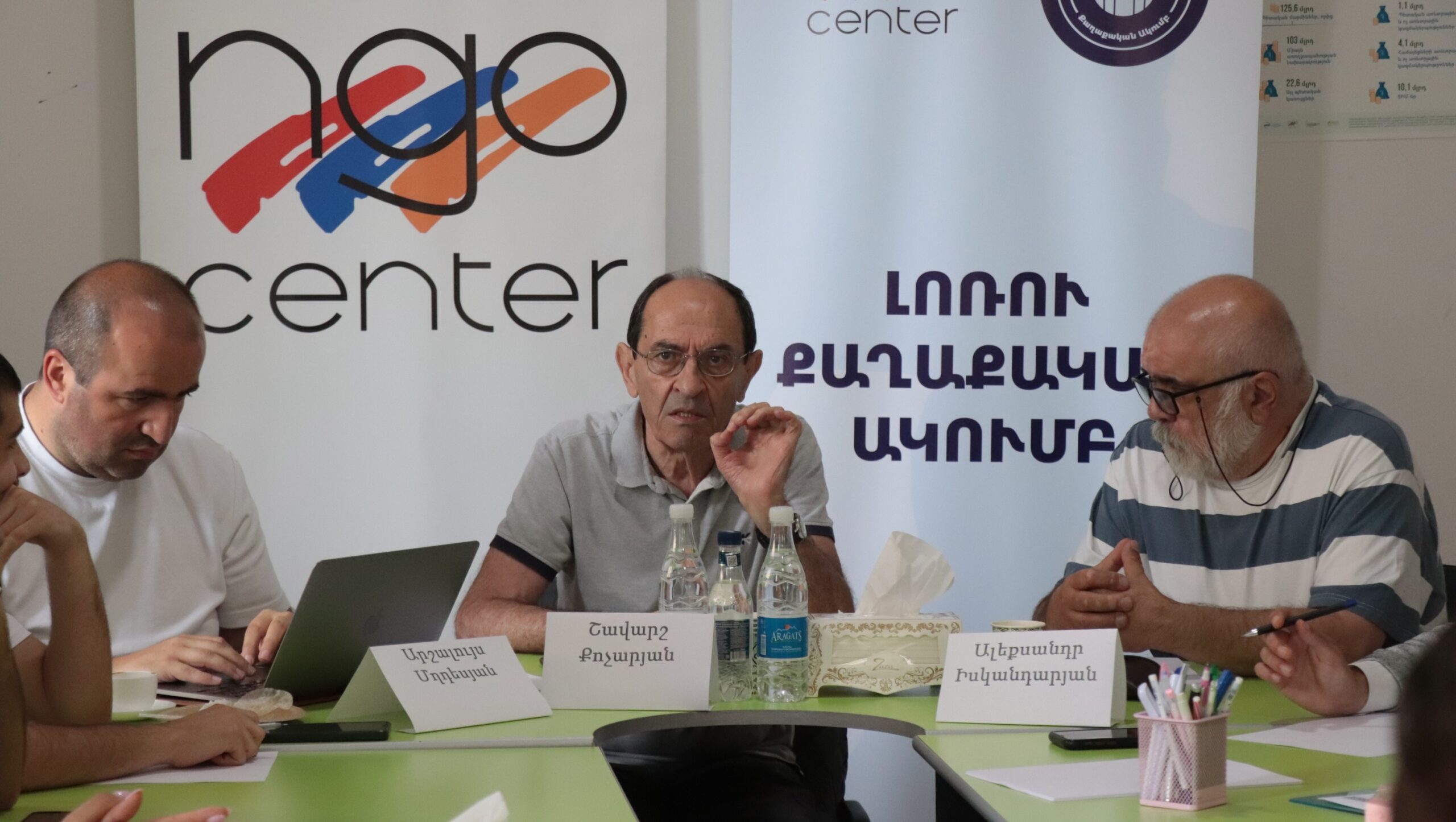
Political Clubs Discussions
PROSPECTS OF ARMENIA’S FOREIGN POLICY
Under the auspices of “Launching Political Clubs in Bordering Regions of Armenia” project the first discussion was implemented in Lori region on October 2, 2024 in cooperation with “NGO” Center. The discussion was dedicated to the foreign policy of Armenia. The participants discussed issues related to the visions of Armenia’s future with Associate Professor of YSU International Relations and Diplomacy Chair, Former Minister of Foreign Affairs of Armenia, Shavarsh Kocharyan and Journalist and Host at CivilNet TV Arshaluys Mghdesyan. The project is supported by the government of the Kingdom of the Netherlands.
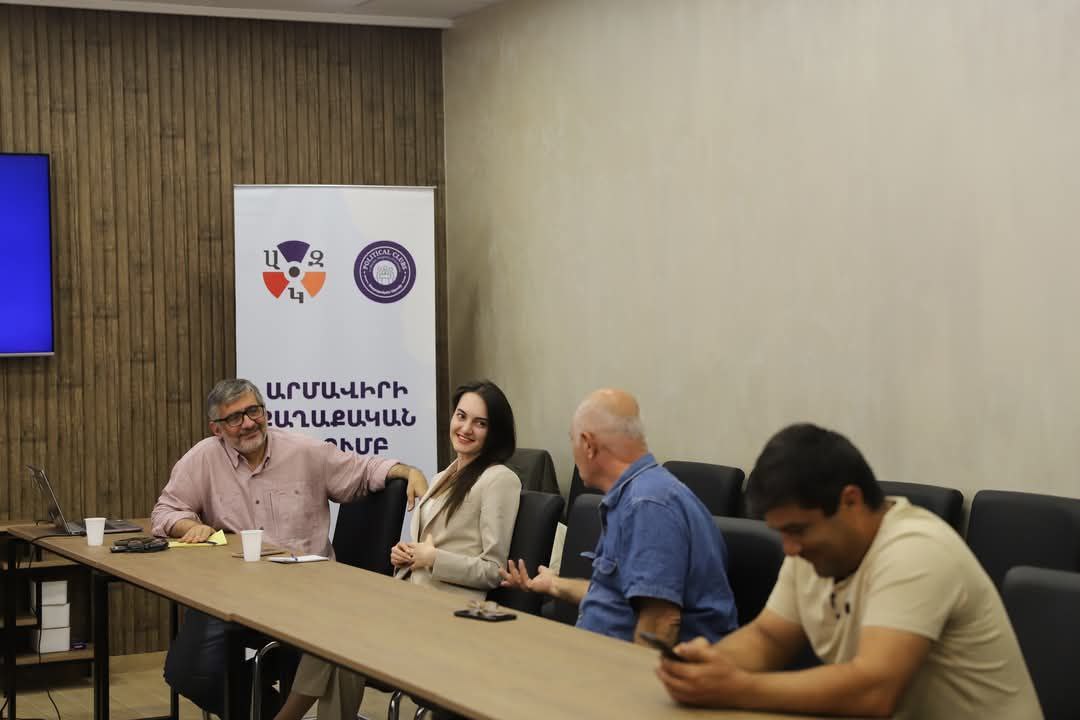
Political Clubs Discussions
WATER MANAGEMENT: ISSUES, CHALLENGES AND POSSIBLE SOLUTIONS
As part of the Launching Political Clubs in Bordering Regions of Armenia project, on October 1, 2024 the third discussion was held in the Armavir region in collaboration with the Armavir Development Center. Expert Alen Amirkhanyan, Director of the American University of Armenia’s (AUA), Acopian Center for the Environment highlighted the existing challenges of the agricultural sector in the Armavir region, particularly the water sector. While the participants discussed with the expert the potential tracks to lay a valuable foundation for sector reforms, they also emphasized the substantial need to establish effective communication between government agencies and local communities to ensure that regional interests and needs are fully considered in the decision-making process. The project is supported by the government of the Kingdom of the Netherlands.
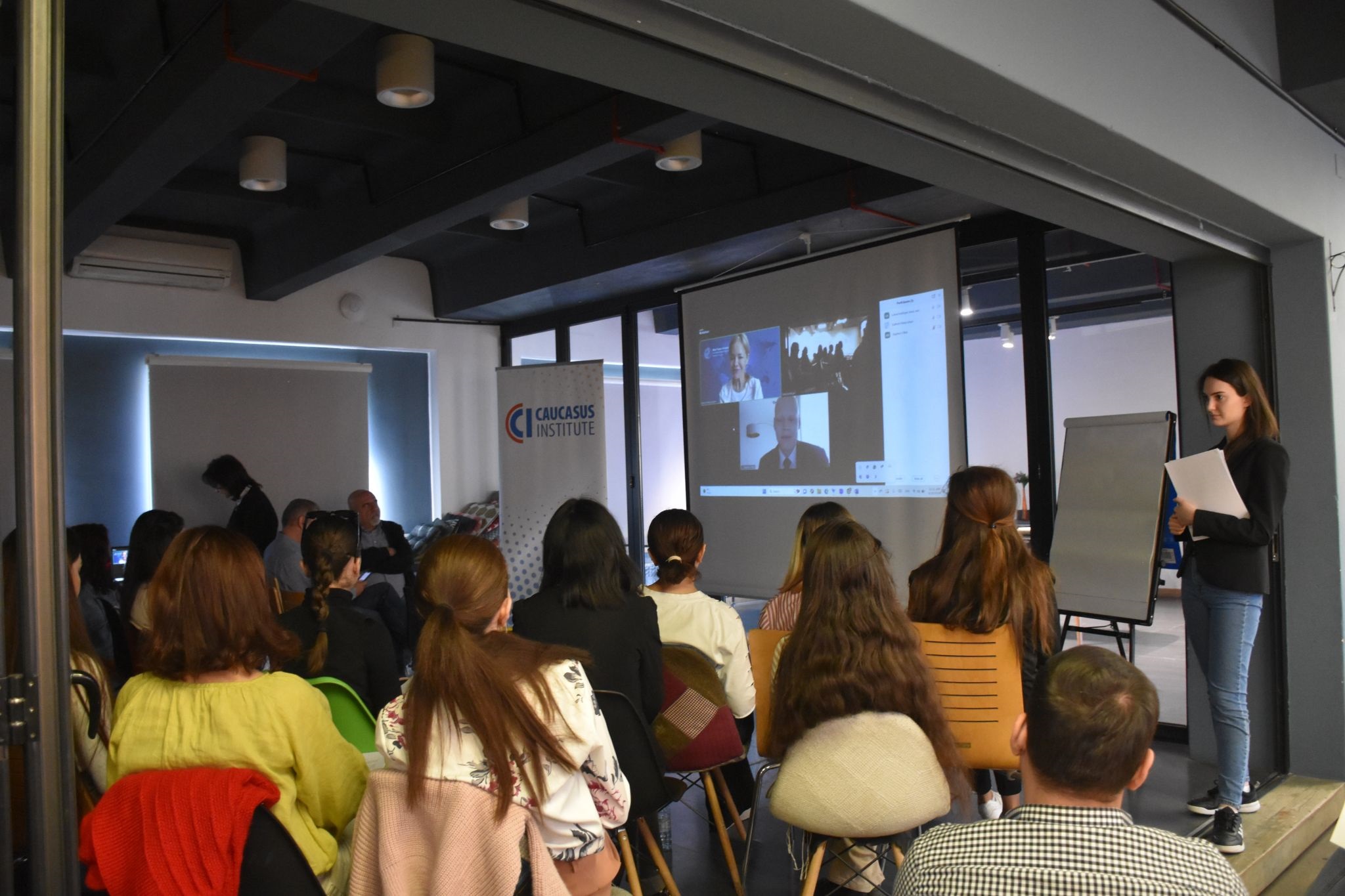
Workshop
ELABORATING VISION ON ARMENIA’S FUTURE:
THE COUNTRY OF MY DREAMS, HOW TO GET THERE
On September 29, 2024 the Caucasus Institute in partnership with the Max Planck Foundation for International Peace and the Rule of Law implemented the second workshop under the auspices of the project Promoting Future Oriented Youth Dialogues, which is generously funded by the German Federal Foreign Office. The workshop was hosted by All Rights Foundation in Gyumri, Shirak province and engaged participants from various communities.
At the workshop, participants explored visions and future prospects for Shirak and Armenia, focusing on key areas such as security, foreign policy, migration, economic development, and education.
In the course of the workshop, the participants mapped out obstacles and challenges impeding progress in each area and went on to identify the stakeholders who could be involved in promoting the desired outcomes in the future. Finally, the participants suggested points of action that the identified stakeholders should take in order to address the current challenges and to create opportunities for progress and change.
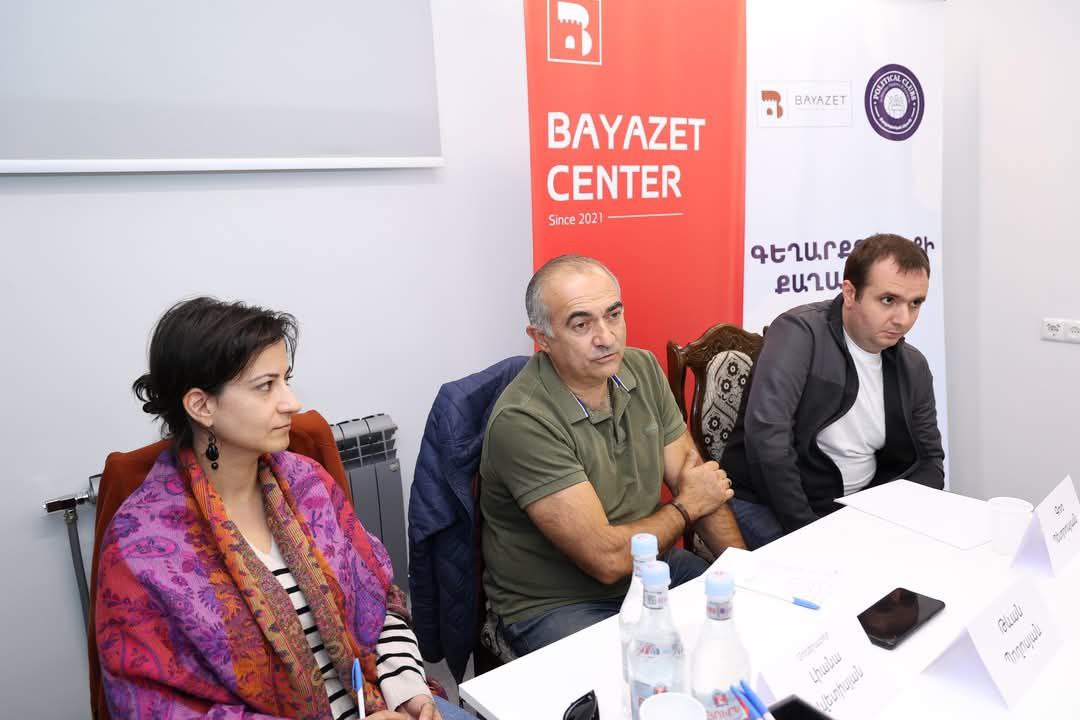
Political Clubs Discussions
PUBLIC POLICY
Under the framework of the Launching Political Clubs in Bordering Regions of Armenia project, the third discussion of the Political Club of Gegharkunik was held on September 28, 2024 at the Bayazet Center in Gavar. Political scientists Gor Petrosyan and Tevan Poghosyan discussed the process of public policy development, highlighting the factors that influence it, along with contemporary approaches to public policy and local opportunities. The conversation focused on current challenges and issues in public policy, including potential solutions proposed by the experts. They also emphasized the importance of lobbying and collaboration with international actors in shaping effective policies. The participants included including NGO representatives, educators, students, staff from local governmental bodies, researchers. The project is supported by the government of the Kingdom of the Netherlands.
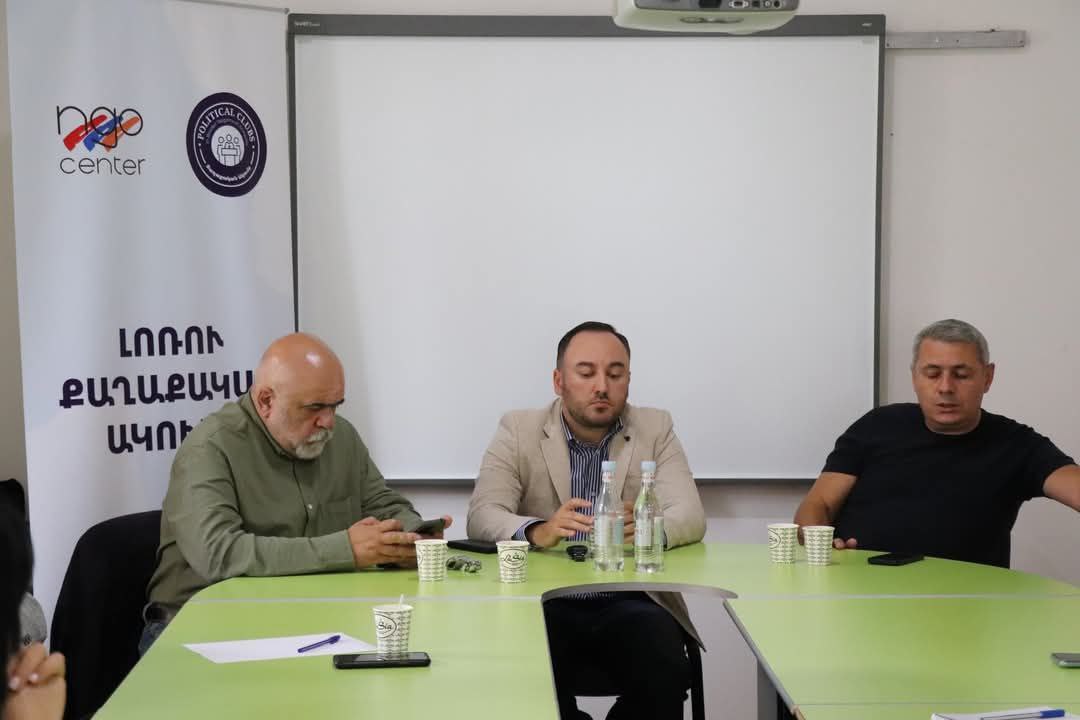
Political Clubs Discussions
THE ROLE OF GEORGIA FOR ARMENIA’S MAINLY PROVINCIAL DEVELOPMENT
Under the framework of the Launching Political Clubs in Bordering Regions of Armenia project, the third discussion was held on September 18, 2024 at the NGO Center in Vanadzor. Experts Sergey Minasyan, Vice-Director of Caucasus Institute and Johnny Melikyan, Research Fellow at the Orbeli Analytical Research Centre (state think tank) reflected on the domestic political situation in Georgia mainly highlighting the upcoming elections and the consequences of their potential outcome. A comparative analysis was presented about the similarities and differences between Armenia and Georgia and how political factors influence bilateral relations. Participants asked question regarding prospects in bilateral relations and further developments in the regional framework. The project is supported by the government of the Kingdom of the Netherlands.
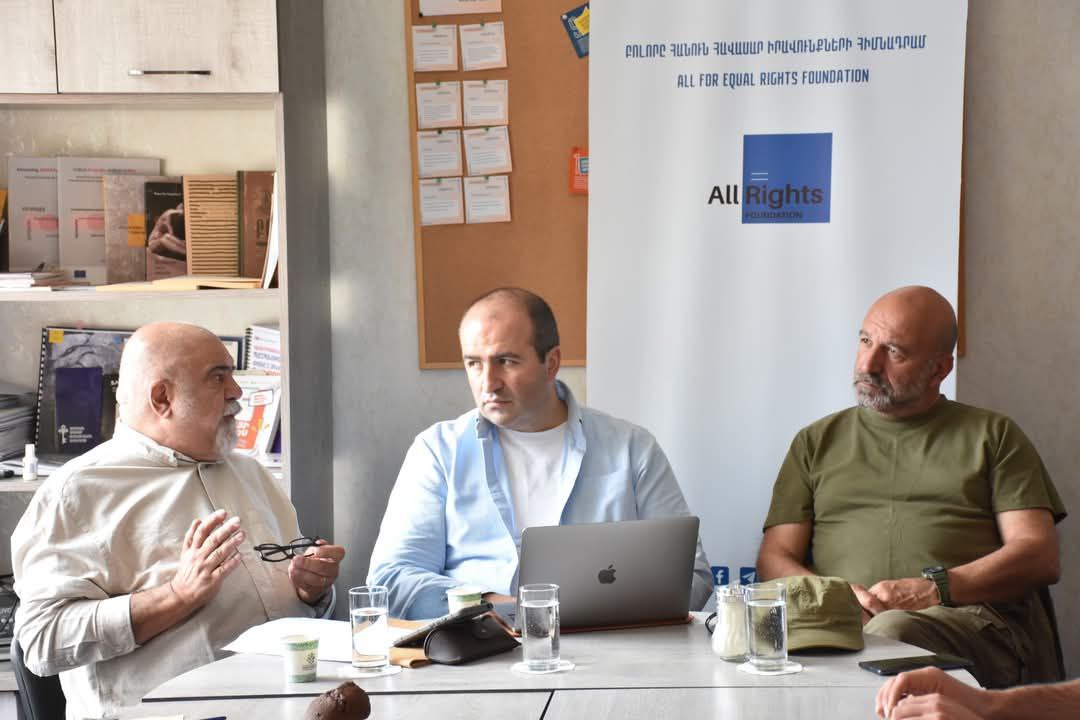
Political Clubs Discussions
PEACE AND SECURITY
Under the framework of the Launching Political Clubs in Bordering Regions of Armenia project, the political club of Shirak launched on September 16, 2024 at the All Rights Foundation in Gyumri. The discussion was led by Vova Vardanov, Head of the VOMA Organization, and Arshaluys Mghdesyan, a journalist and host at CivilNet Online TV. The focus of the session was on strategies to strengthen regional security capacities. During the event, the speakers shared their vision for regional security and proposed practical approaches for improving the security framework. They also highlighted the crucial role of engaging society in security matters, especially through local initiatives, and the importance of raising awareness among the youth. The project is supported by the government of the Kingdom of the Netherlands.
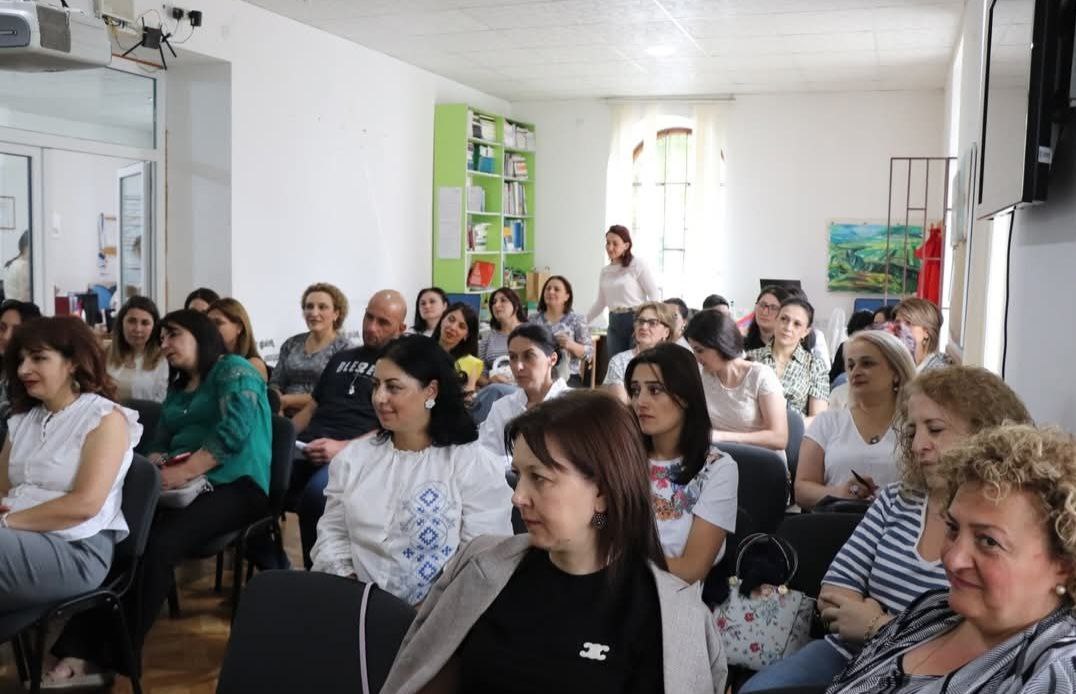
Political Clubs Discussions
NEW EDUCATIONAL STANDARDS AND THEIR INFLUENCE
Under the framework of the Launching Political Clubs in Bordering Regions of Armenia project, the second discussion was held on August 30, 2024 at the NGO Center in Vanadzor. The event was organized in collaboration with local educators and attracted 39 participants, primarily teachers and educators from Vanadzor and surrounding communities. The discussion was led by education experts Serob Khachatryan and Serine Avetisyan, Director of Evrista Private School. The focus of the discussion was on the implementation process of new educational standards and their impact on the development of Armenia’s education sector. The experts emphasized the key components of the reform, highlighting its fundamental role in the modernization of education. However, they also addressed the challenges and obstacles associated with the process. The project is supported by the government of the Kingdom of the Netherlands.
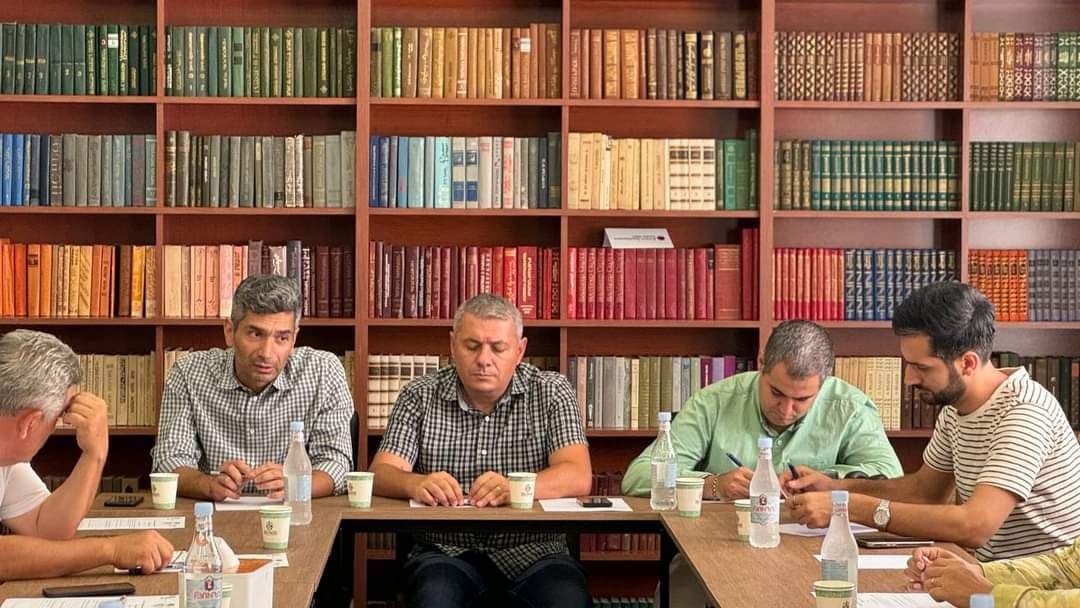
Political Clubs Discussions
THE CONSEQUENCES OF POTENTIAL OPENING OF ARMENIAN-TURKISH BORDER
On August 30, 2024 as part of the “Launching Political Clubs in Bordering Regions of Armenia” project, a second discussion was held in the Armavir region in collaboration with the Armavir Development Center. This session focused on the potential opening of the Armenian-Turkish border and its impact on the regional economy. The discussion featured insights from political scientist Hrant Mikaelyan and turkologist Artak Shakaryan, a Candidate of Historical Sciences. Participants included active citizens, students, business leaders, and agriculturalists from various communities of Armavir. The project is supported by the government of the Kingdom of the Netherlands.
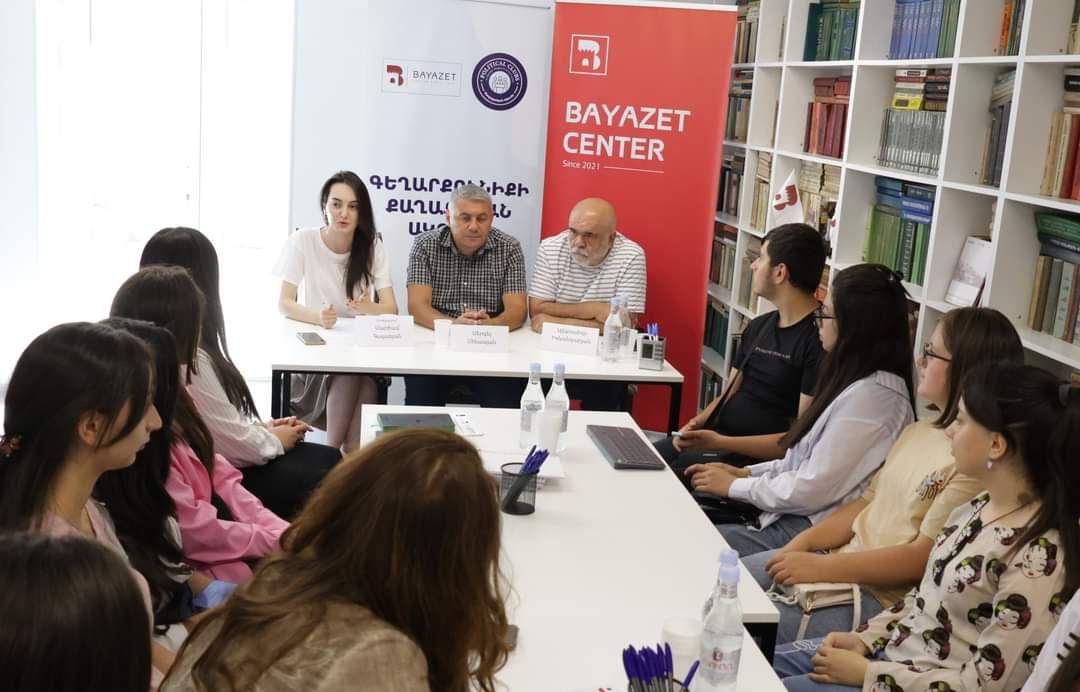
Political Clubs Discussions
PROSPECTS OF PEACE AND SECURITY IN THE REGION
On August 29, 2024 as part of the “Launching Political Clubs in Bordering Regions of Armenia” project, a second discussion was held in the Gegharkunik region in collaboration with the “Bayazet” Center NGO. This discussion was dedicated to the peace and security trends in the region. Political scientist, President of Caucasus Institute Alexander Iskandaryan and security expert, Vice-director of Caucasus Institute Sergey Minasyan shared insights on the topic. Participants included active citizens and students from various communities of Gegharkunik. The project is supported by the government of the Kingdom of the Netherlands.
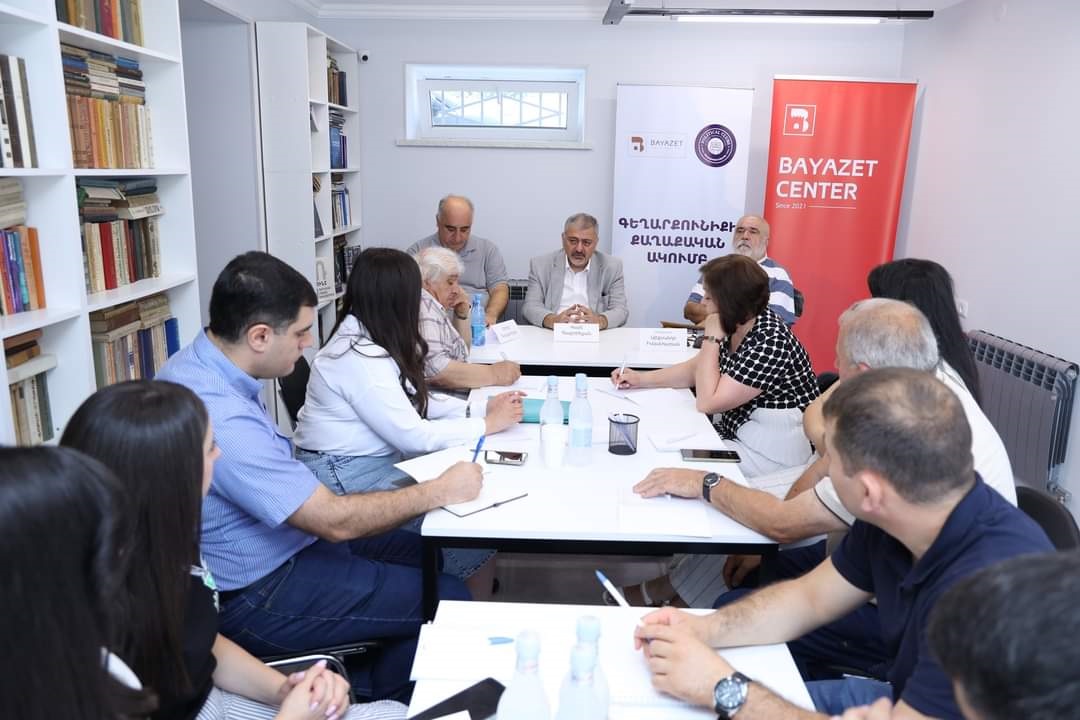
Political Clubs Discussions
CONCEPTUAL MASTER PLAN OF “ACADEMIC CITY”
Under the auspices of “Launching Political Clubs in Bordering Regions of Armenia” project the first discussion was implemented in Gegharkunik region on July 27, 2024 in cooperation with “Bayazet” Center NGO. During the discussion participants from various communities of Gegharkunik discussed the issues related to the conceptual master plan of the “Academic City” with Dean of the College of Business and Economics at the American University of Armenia Vache Gabrielyan and education expert Serob Khachatryan. The project is supported by the government of the Kingdom of the Netherlands.
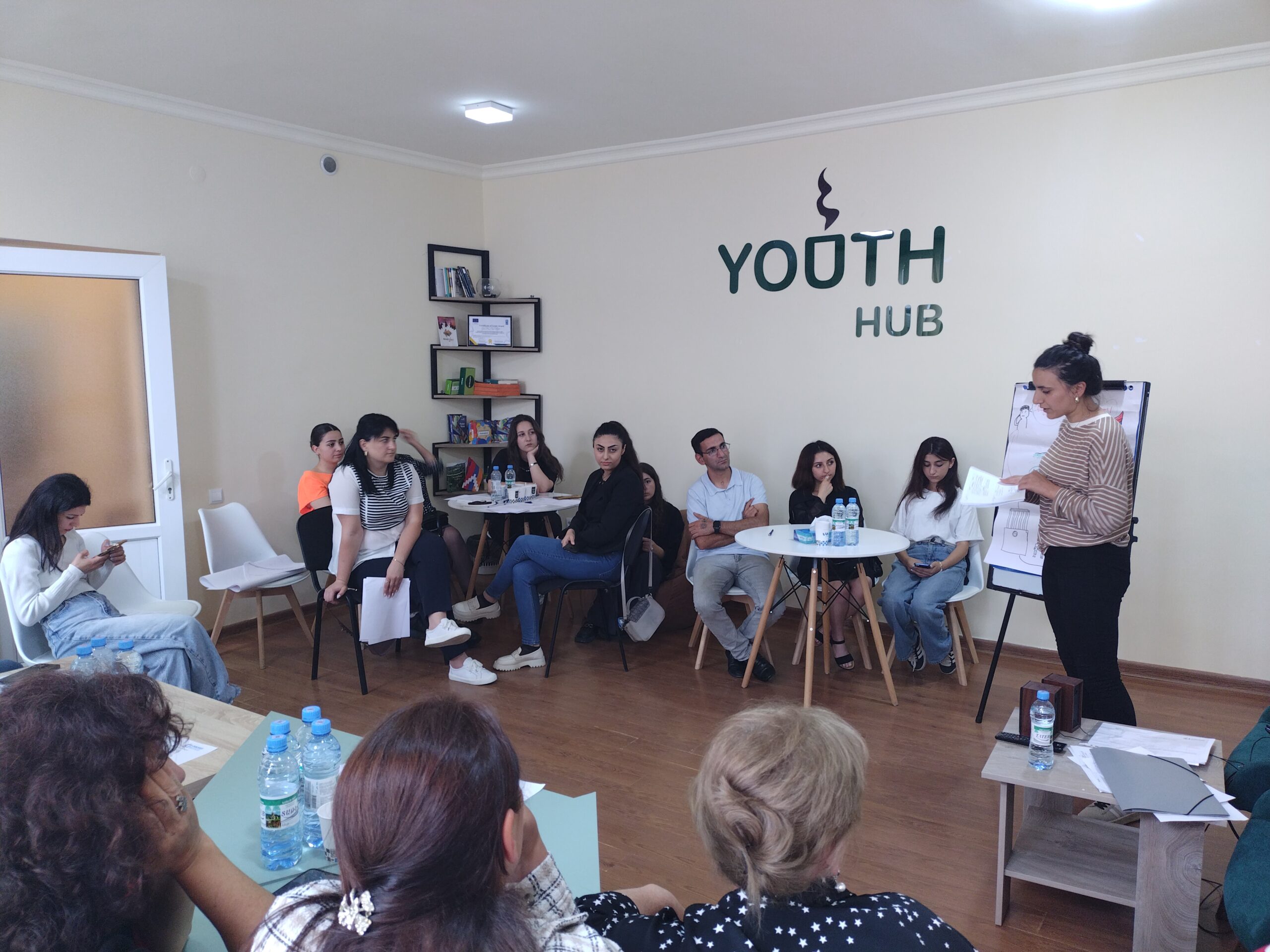
Workshop
ELABORATING VISION ON ARMENIA’S FUTURE:
THE COUNTRY OF MY DREAMS, HOW TO GET THERE
On July 25, 2024, Promoting Future Oriented Youth Dialogues project was launched in Goris, Syunik, with a workshop hosted by Goris Press Club. Youth from various communities in Syunik participated, envisioning the future of Syunik and Armenia over the next 15-20 years in areas like security, foreign policy, migration, economy, and education. They identified barriers to achieving this ideal future, mapped relevant stakeholders, and proposed key actions to address current challenges. However, the workshop revealed that the youth’s vision for the future is pretty blurry and controversial. Imagining the ideal region/country they would like to live in turns out to be extremely challenging, let alone the ways to overcome the existing obstacles.
The workshop was held in the framework of the project “Promoting Future Oriented Youth Dialogues”, implemented by the Caucasus Institute in cooperation with the Max Planck Foundation for International Peace and the Rule of Law. The project is funded by the German Federal Foreign Office.
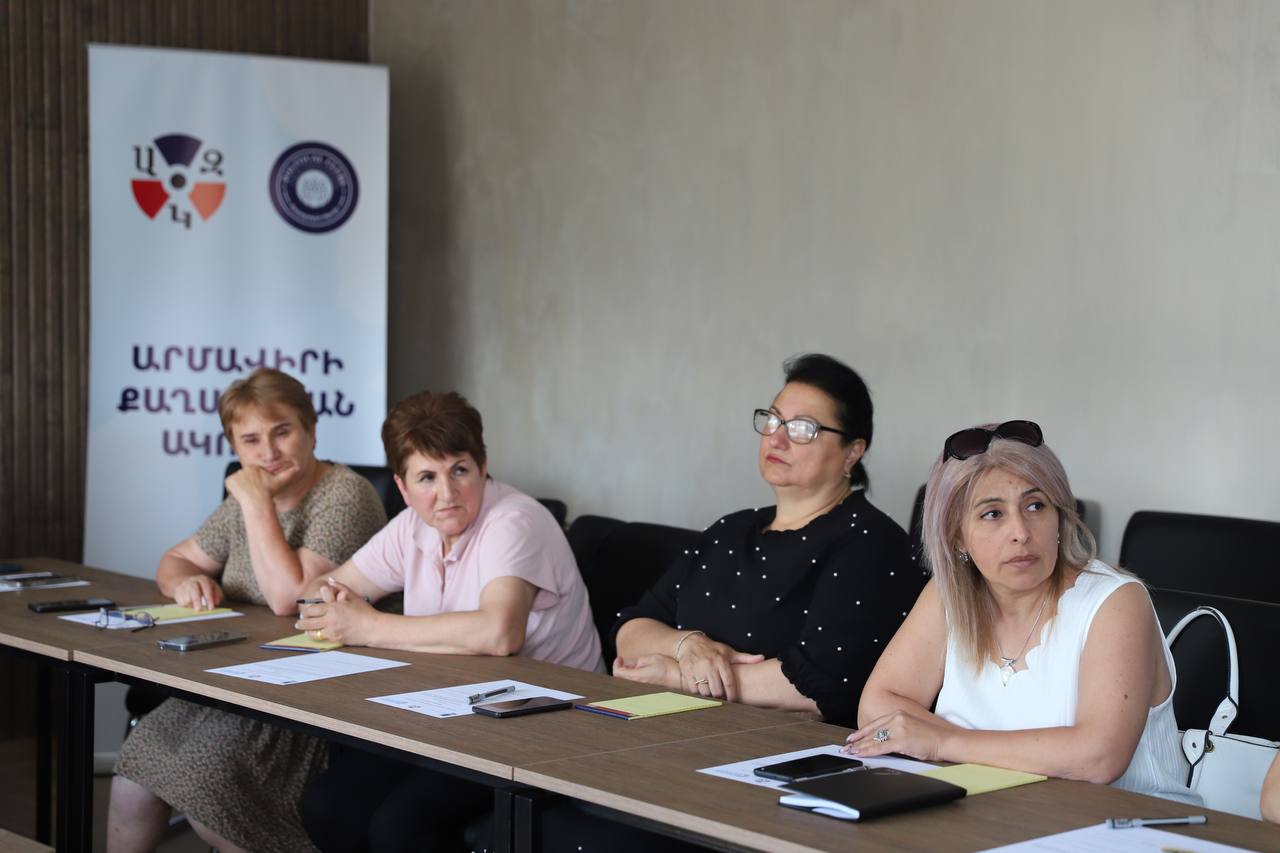
Political Clubs Discussions
INTRODUCTION OF NEW EDUCATIONAL STANDARDS
In July “Launching Political Clubs in Bordering Regions of Armenia” project kicked off its second phrase. The first discussion was held in Armavir region on July 19, 2024. Thymen Kouwenaar, the Deputy head of Mission at the Embassy of the Kingdom of the Netherlands made the opening remarks. Under the auspices of Armavir Development Center, teachers and educational workers of Armavir region discussed the introduction of new educational standards with education expert Serine Avetisyan and Director of NCEDI Foundation Artashes Torosyan. The project is supported by the government of the Kingdom of the Netherlands.
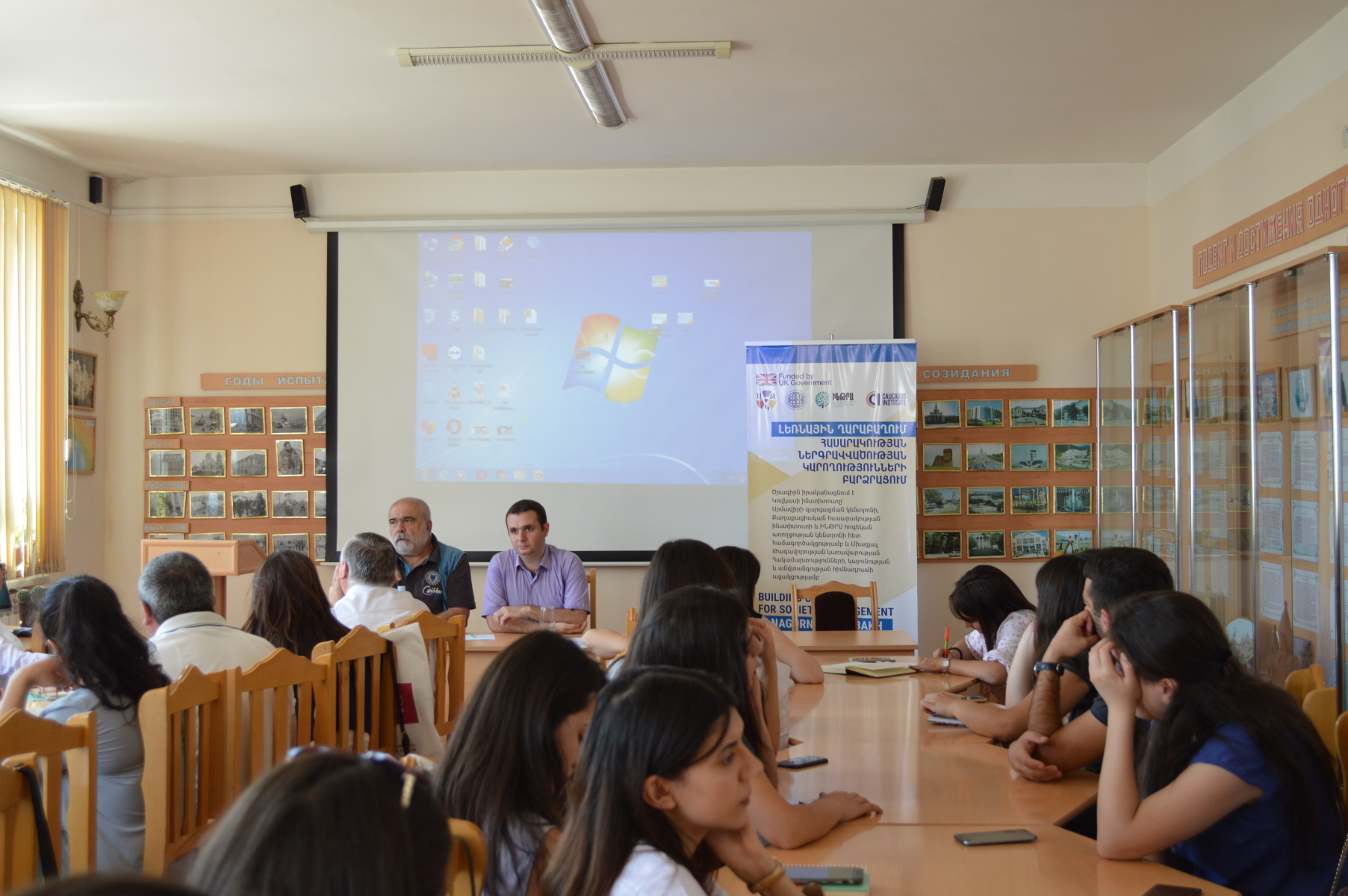
Lecture
EMERGENCE AND EVOLUTION OF DEMOCRACY
On June 25 Caucasus Institute organized a public lecture at the Artsakh State University which was conducted by the Director of the Caucasus Institute Alexander Iskandaryan and research fellow of the Caucasus Institute Gor Petrosyan. The lecture was hosted by Artsakh State University. During the lecture speakers touched upon the origins and grounds of emergence of democracy. During lecture the speakers represented to the audience the historical preconditions for the emergence of democracy, historical stages and stages of transformation of democracy. Speakers in detail explained the meaning of democracy in modern world, the systems and requirements needed to fulfill in order to be named democracy.
The lecture was followed by a Q&A session, where the participants of the lecture discussed the theoretical backgrounds and the threats democracy faces today. The issue of competence in democratic societies also was touched upon. The students and lecturers of Artsakh State University were also interested about local, regional and international processes and developments.
The lectures are held in the framework of a project on Building Capacity for Societal Engagement in Nagorno-Karabakh implemented by the Caucasus Institute in partnership with Armavir Development Centre, Civil Society Institute and INTRA Mental Health Centre with support from the UK Government’s Conflict, Stability and Security Fund.
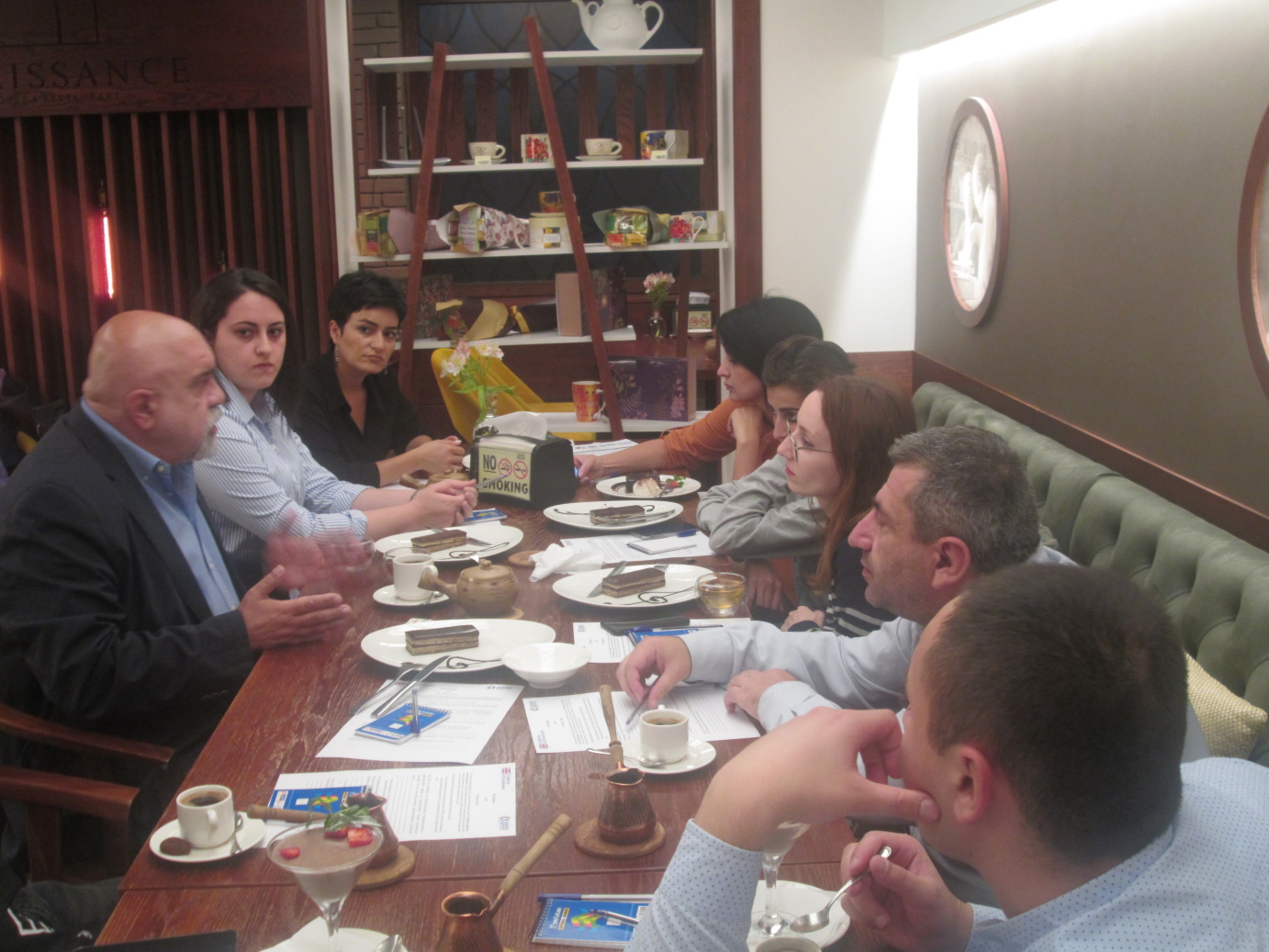
Tea party
DEMOCRACY, DEMOCRATIZATION AND ELECTIONS
Do we have the right to complain about our own choices after elections? Or should we keep silent and just accept our responsibility for the choices contemplating the repercussions? That was one of the questions that were discussed during the CI Tea Party held in Stepanakert on September 12, 2019 and moderated by Alexander Iskandaryan, Director of the Caucasus Institute.
The discussions are held in the framework of a project on Building Capacity for Societal Engagement in Nagorno-Karabakh implemented by the Caucasus Institute in partnership with Armavir Development Centre, Civil Society Institute and INTRA Mental Health Centre with support from the UK Government’s Conflict, Stability and Security Fund. The opinions and statements that will be made and discussed during the event may not coincide with the official position of the UK Government.
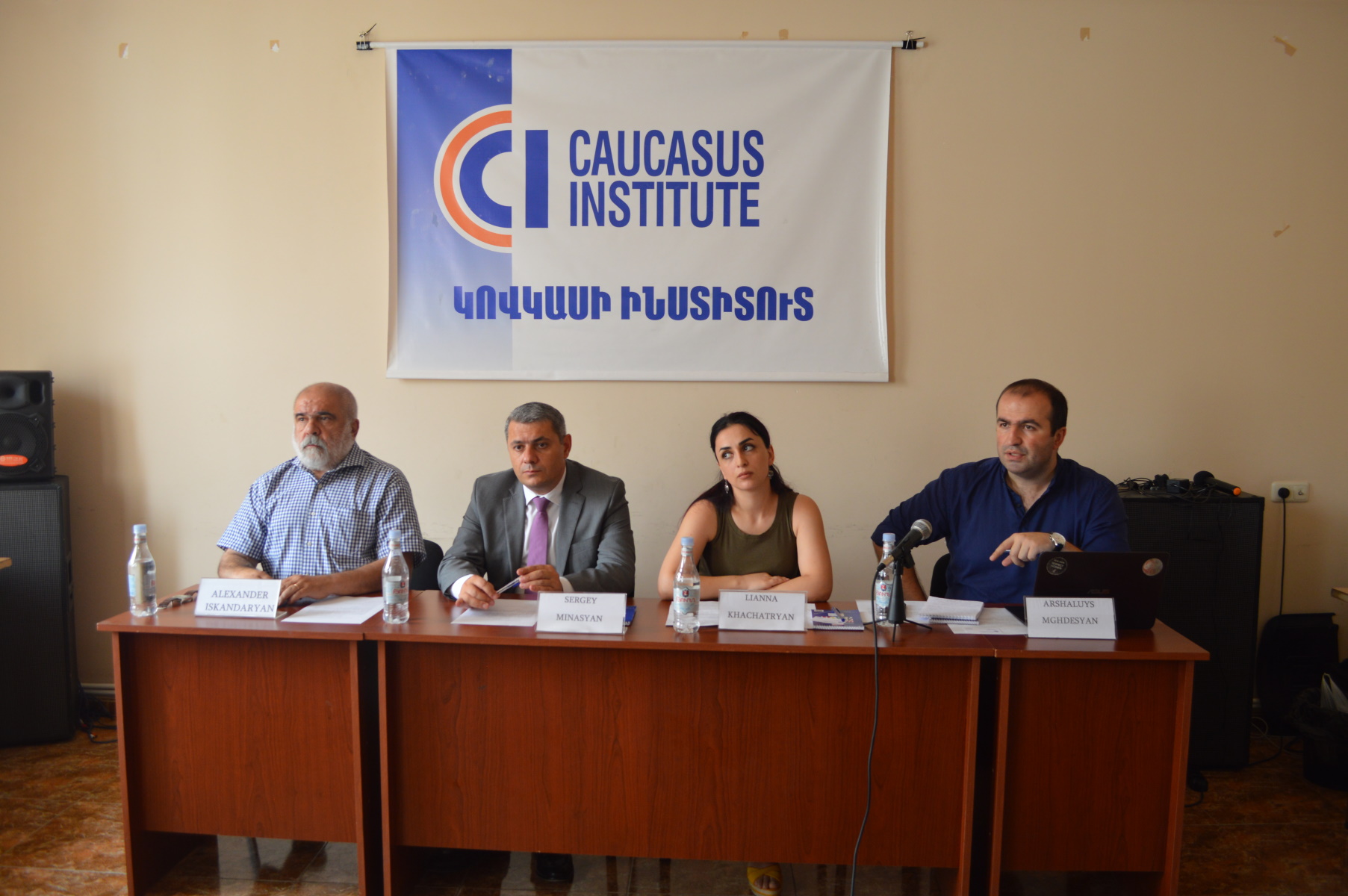
Roundtable
ARMENIA AND ROMANIA: COMMUNITY, COOPERATION AND PERSPECTIVES
On July 23, 2019 a round table-discussion on “Armenia and Romania: community, cooperation and perspectives” was organised at the Caucasus Institute. Lianna Khachatrian, a participant of a study visit to Romania, journalist, shared her comments on the minorities in Romania (on the example of the Armenian community). Arshaluis Mghdesyan, another participant of a study visit, journalist, presented the Romania’s experience in fight against corruption. Dr. Sergey Minasyan, Ambassador Extraordinary and Plenipotentiary of the Republic of Armenia in Romania was also present at the event.
The event was organized within the framework of the Transition Experience Exchange between Romania and Armenia program, implemented by the Caucasus Institute. The program is a joint initiative of the Caucasus Institute (Armenia) and Expert Forum (EFOR, Romania) supported by the Black Sea Trust for Regional Cooperation, a Project of The German Marshall Fund of the United States. Opinions expressed during the discussion do not necessarily represent those of the Black Sea Trust or its partners.
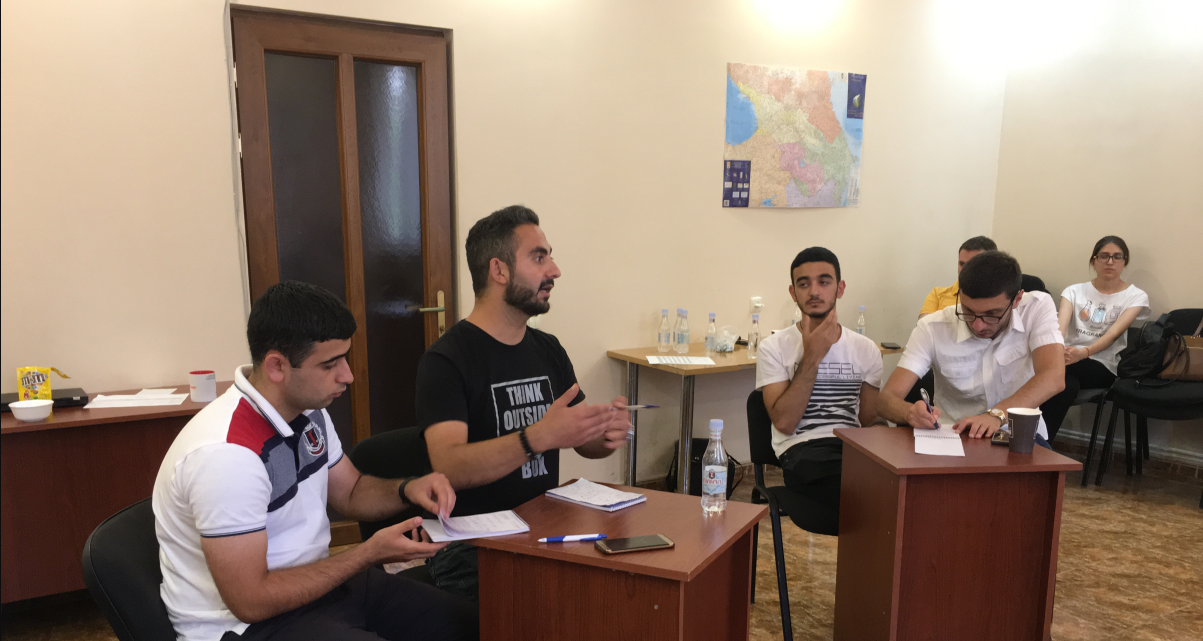
Debate
DEBATE ON “ANTI-CORRUPTION EXPERIENCE IN THE EU MEMBER STATES: WHAT CAN ARMENIA LEARN?”
Anti-Corruption Experience in the EU Member States: What Can Armenia Learn? This was the topic of a youth political debate held at the Caucasus Institute on July 18, 2019. At the beginning, Gor Petrosyan, CI research fellow, presented Romania’s anti-corruption experience.
The participants were divided into four groups representing:
• Anti-corruption Commission
• Members of a legislature (the ruling party members)
• Parliamentary opposition
• Private sector
The first part of the event unfolded in two stages:
• First, one general question was asked, in response to which each of the debating teams delivered a speech. Then the teams proceeded with Q&A.
• The second stage was a quiz that was followed by the final presentations of the debating teams summarizing the debates.
The main question raised during the first stage of the second part of the event was: what is the fight against corruption?
The second stage, a quiz included but was not limited to the following questions:
– Is the fight against corrupt officials actually fight against corruption?
– Is there only financial corruption?
– Minor or major corruption? Which is more dangerous?
– Does democracy contribute to the fight against corruption?
After the debate, participants shared their impressions of the event.
The program is a joint initiative of the Caucasus Institute (Armenia) and Expert Forum (EFOR, Romania) supported by the Black Sea Trust for Regional Cooperation, a Project of The The German Marshall Fund of the United States.
Opinions expressed in the print brochure do not necessarily represent those of the Black Sea Trust or its partners.
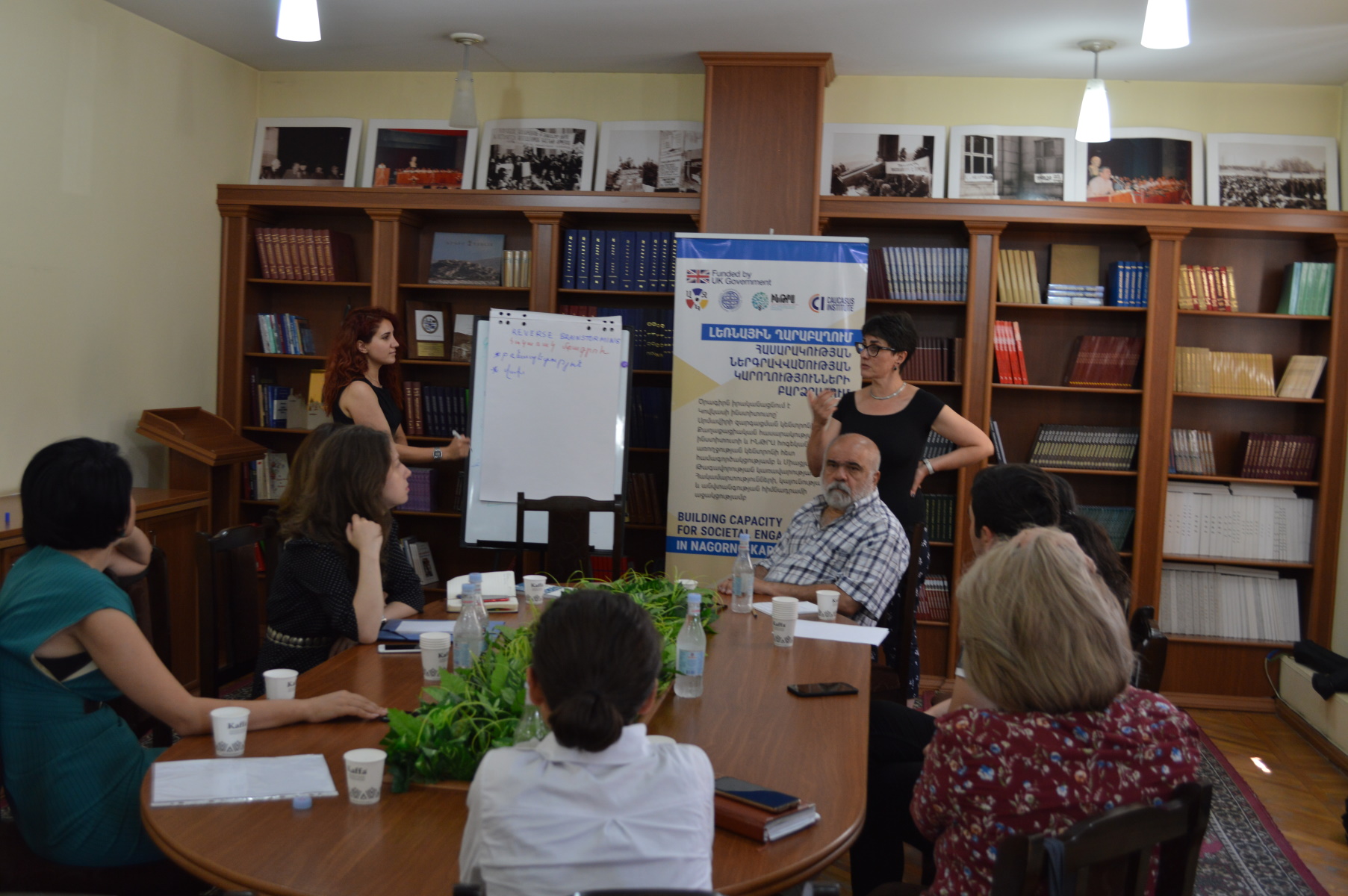
Workshop
PEACE OR WAR: CAN I MAKE A DIFFERENCE?
On June 28, 2019 the Caucasus Institute hosted a workshop at the National Assembly of Nagorno-Karabakh on societal engagement in decision-making over the resolution of the Nagorno-Karabakh conflict.
CI expert Nina Iskandaryan moderated the first part of the workshop. Ms. Iskandaryan conducted a brainstorming activity, engaging the participants in examining the level of freedoms and democracy in their society, drawing conclusions regarding their role in the peacebuilding activities, as well as in determining political and social life of their country.
CI research fellow Gor Petrosyan touched upon the conflict in Nagorno-Karabakh, highlighting the fact that the keys to the conflict resolution do not lay in Paris, Moscow or elsewhere. The axis of the conflict is Yerevan-Stepanakert-Baku, where the societies are more radical than the elites. Inasmuch as they influence the political leadership, a shift in societal perceptions is necessary. The speaker generated a debate-discussion concerning the role of a citizen in this particular context. Alexander Iskandaryan, Director of the Caucasus Institute made some final remarks and answered to the questions of the participants regarding citizen participation, upcoming elections in Karabakh etc.
The workshop is part of a project on Building Capacity for Societal Engagement in Nagorno-Karabakh implemented by the Caucasus Institute in partnership with Armavir Development Centre, Civil Society Institute and INTRA Mental Health Centre with support from the UK Government’s Conflict, Stability and Security Fund.
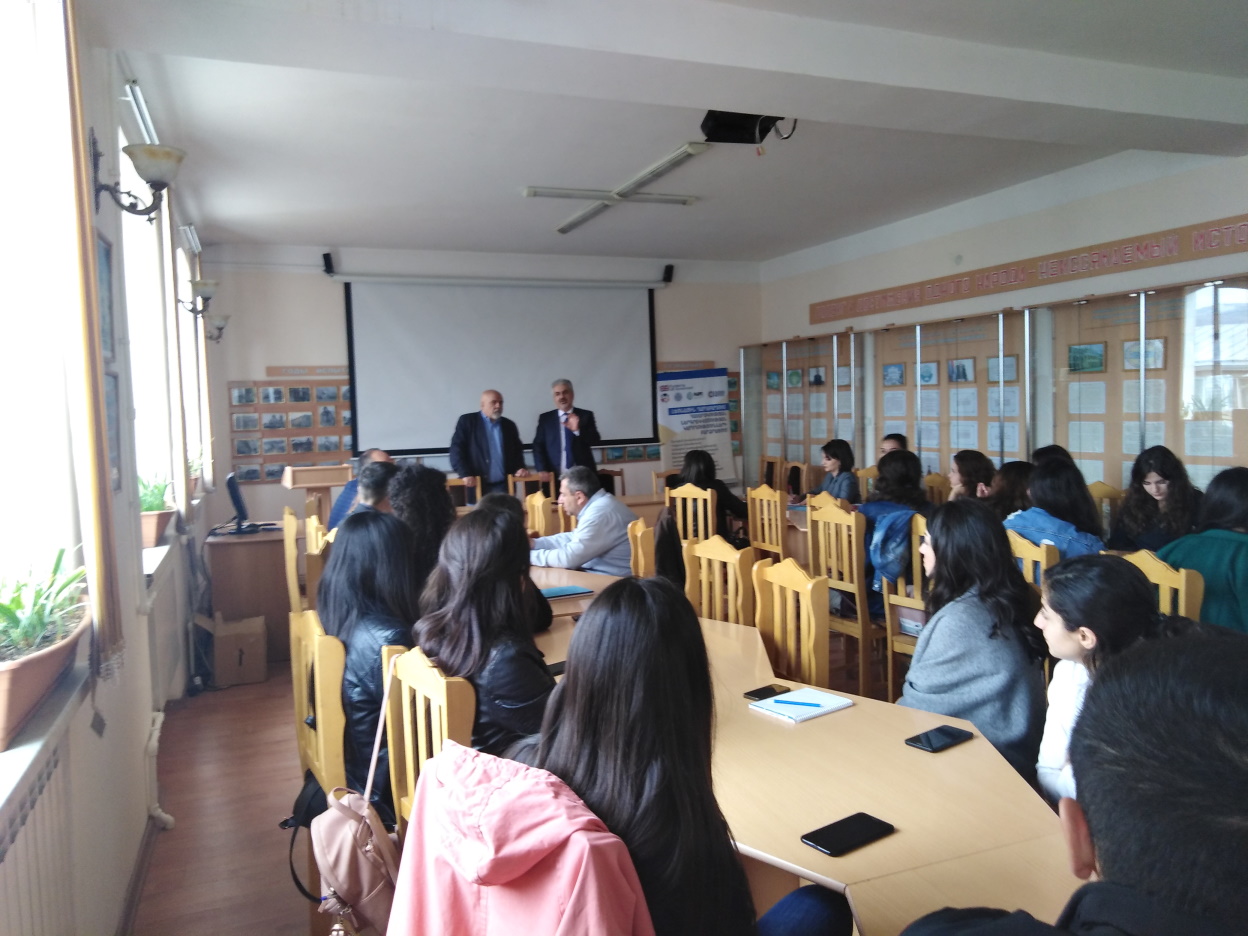
Lecture
EMERGENCE OF DEMOCRACY AND ITS TYPES
As young democracies, Nagorno-Karabakh and Armenia have a long way to go in order to develop the culture of elections and conscious voting and responsibility for one’s vote. Yet, unlike developed democracies, the new ones at least have examples, which can help accelerate that process. This idea was voiced by Alexander Iskandaryan, director of the Caucasus Institute during the “Emergence of democracy and its types” lecture at Artsakh State University in Stepanakert on September 12, 2019. The discussions are held in the framework of a project on Building Capacity for Societal Engagement in Nagorno-Karabakh implemented by the Caucasus Institute in partnership with Armavir Development Centre, Civil Society Institute and INTRA Mental Health Centre with support from the UK Government’s Conflict, Stability and Security Fund. The opinions and statements that were made and discussed during the event may not coincide with the official position of the UK Government.